#even if he does have a lot of…interesting views on A Handmaid’s Tale
Explore tagged Tumblr posts
Text
I should take up a crafting hobby of some kind to keep the hands busy when I binge watch things; something I can keep up with if, for some unforeseen reason, I ever get sent to Arkham. They probably don’t allow sharp objects in there so knitting and needlepoint are out, but I bet they allow crochet hooks.
#This totally isn’t a vauge post about a dude in my class#whom I absolutely don’t want to crack in half over my knee like a glowstick#even if he does have a lot of…interesting views on A Handmaid’s Tale#arkham asylum#only in gotham#only in gotham rp#gotham oc rp#gotham oc#gotham roleplay#gotham rp#dc oc roleplay#dc ocs#dc oc blog#dc oc#dc oc rp#dc rp
6 notes
·
View notes
Text
POSITIVES & NEGATIVES.
fill out & repost ♥ This meme definitely favors canons more, but I hope OCs still can make it somehow work with their own lore, and lil’ fandom of friends & mutuals. Multi-Muses pick the muse you are the most invested in atm.


MUSE.
MY MUSE IS: canon / oc / au / slightly canon-divergent / fandomless / complicated. (headcanon heavy)
IS YOUR CHARACTER POPULAR IN THE FANDOM? YES / NO / IDK / KINDA.
IS YOUR CHARACTER CONSIDERED HOT™ IN THE FANDOM? YES / NO / IDK / KINDA.
IS YOUR CHARACTER CONSIDERED STRONG IN THE FANDOM? YES / NO / IDK / KINDA.
ARE THEY UNDERRATED? YES / NO / IDK / KINDA.
WERE THEY RELEVANT FOR THE MAIN STORY? YES / NO.
WERE THEY RELEVANT FOR THE MAIN CHARACTER? YES / NO / THEY’RE THE PROTAG.
ARE THEY WIDELY KNOWN IN THEIR WORLD? YES / NO.
HOW’S THEIR REPUTATION? GOOD / BAD / NEUTRAL (kinda?? people think he's annoying)
HOW STRICTLY DO YOU FOLLOW CANON?
I try to stick to canon as much as I can, but my Ivar is also pretty headcanon driven at times because canon doesn't give us a ton to work with. He's just such an interesting character to me. Just as interesting as Jude, but even more so since they're like two sides of the same coin. I try to take his views on Jude into account but also try to focus on a bit more than that. Like... boy has a one track mind, but there's more to him than just being hyper focused on Milla or Jude. You know?
SELL YOUR MUSE! Aka try to list everything, which makes your muse interesting in your opinion to make them spicy for your mutuals.
My lovely mutuals, I present to you one good boy chosen to be the handmaid of Milla Maxwell!
He's devoted, he's loyal, and he's willing to drop everything in the name of doing his duties. He is a beastcrafter, meaning he can communicate with animals! He dual wields daggers! He's funny!
He's also good with kids and animals. Could be a good babysitter (maybe). Also, he has cool sunglasses! What's not to like?
Also he's (maybe??) near unkillable to some degree? Boy lodged a piece of his own dagger into his head and survived.
Now the OPPOSITE, list everything why your muse could not be so interesting (even if you may not agree, what does the fandom perhaps think?).
Okay so let's get this out of the way. Ivar is a dingus supreme. That willingness to drop everything to fulfill his duties? The downside to that is that if he thinks his duty to protect Milla is more important than say, protecting Nia Khera, he will drop the latter in favor of the former. Much to the annoyance of anyone involved.
Ivar can be pretty intense when it comes to how he decides who he doesn't like. Sorry, Jude, but you're the best example here. Boyo was going to try and kill Jude because how dare Milla have someone else that she puts a lot of trust in instead of him. Boyo got so focused on fighting Jude that he allowed Milla to start crawling away to get to her destination on her own.
So, yeah, he's got a short temper. That can lead to him doing dumb things, especially if he thinks it will lead to him one upping someone he doesn't like.
Also, don't let him anywhere near guns. The fact he accidentally fired one while trying to teach Ludger how to use one should be all you need to know.
WHAT INSPIRED YOU TO RP YOUR MUSE?
I've always really liked Ivar as a character. As stated above, I love the fact that he and Jude basically are two sides of the same coin. The fandom thinks he's annoying and while I can at least see where they're coming from, I think there's a lot more to him than what the fandom sees. He's fascinating to me. I feel like he could have made an interesting addition to the party.
Mostly, though? I just wanted to give him some love. So I grabbed him as one of my many muses. Because he's my silly little guy.
WHAT KEEPS YOUR INSPIRATION GOING?
Just thinking about this dingus is enough sometimes. But also like?? Plotting and chatting with my friends is also a big help. Just having other Tales writers to bounce off of, especially other Xillia muse enjoyers, is just the ticket.
MUN.
DO YOU THINK YOU GIVE YOUR CHARACTER JUSTICE? YES / NO / KINDA.
DO YOU FREQUENTLY WRITE HEADCANONS? YES / NO / KINDA. (I really should write more headcanons!)
DO YOU SOMETIMES WRITE DRABBLES? YES / NO. (not for Ivar specifically, but that might change!)
DO YOU THINK A LOT ABOUT YOUR MUSE DURING THE DAY? YES / NO / KINDA.
ARE YOU CONFIDENT IN YOUR PORTRAYAL? YES / NO / KINDA.
ARE YOU CONFIDENT IN YOUR WRITING? YES / NO / KINDA.
ARE YOU A SENSITIVE PERSON? YES / NO / KINDA.
DO YOU ACCEPT CRITICISM WELL ABOUT YOUR PORTRAYAL?
YES ABSOLUTELY. As long as it's not just 'Lol, your Ivar sucks' and doing nothing to elaborate on how I could improve, then by all means throw your critique at me!
DO YOU LIKE QUESTIONS, WHICH HELP YOU TO EXPLORE YOUR CHARACTER?
YES, YES, YES!!
IF SOMEONE DISAGREES TO A HEADCANON OF YOURS, DO YOU WANT TO KNOW WHY?
I mean, it depends on the headcanon. Like I headcanon Ivar is very distantly related to the Kresnik Clan based on tiny things I picked up on in my most recent playthrough of Xillia 2. Mostly just in relation to the Maxwell stuff. But I could see people seeing that headcanon and going 'Um?? No, that's dumb' and I would be fine with that. Different interpretations, it's all good.
Now if it was my headcanon that Ivar's got a forehead scar from the aforementioned dagger piece getting lodged in his head that people disagreed with, that would be something I'd like to hear about.
IF SOMEONE DISAGREES WITH YOUR PORTRAYAL, HOW WOULD YOU TAKE IT?
I mean, honestly? There's always going to be people that don't like how people write canon characters. If someone disagrees with how I write Ivar? That's all good. So I wouldn't be too bothered.
It only would become an issue if someone disagreed with my portrayal and then like... proceeded to be nasty about it. You know?
IF SOMEONE REALLY HATES YOUR CHARACTER, HOW DO YOU TAKE IT?
So far I've not come across anyone who actively hates Ivar, which is good. But I know the fandom is pretty quick to call him annoying which, honestly, I could see as people just jumping to hating him because of how he's presented. Especially in Xillia 1. So if you hate Ivar? That's cool, man. Just let me enjoy my funny little dingus.
ARE YOU OKAY WITH PEOPLE POINTING OUT YOUR GRAMMATICAL ERRORS?
YES. YES, PLEASE. That and spelling errors. I like to think I'm pretty thorough with checking my replies, but sometimes I'm not. Please feel free to point out errors. I'm not perfect.
DO YOU THINK YOU ARE EASY GOING AS A MUN?
I think so? For all I know, though, I could be wrong.
tagged by: Stolen from @mathcs tagging: Whoever wants to!
2 notes
·
View notes
Note
makes me sad how little bellarke fics are being made/updated nowadays :( I know it’s natural for fandoms to slow down once the show ends but tbh I didn’t expect it to be this bad, as an author yourself do you think it might be due to the terrible show ending or is there also lack of engagement from the readers?
I think a lot of people pulled away after the finale, that's true but there's also some who did that and after some time came back upon realizing that this final isn't *their* final. Of course that does play some role into it and I understand that people aren't like me, at least not most, I can just ignore it and keep doing what I love, writing fanfic and making gifs. I just love doing that. But others can't because of this and I get it. I've always been able to pull myself away from the narrative, even when the show was still going on. Also over the years I see some stuff differently and come to consider points I haven't before but most people don't do that.
I think part of it is also the culture we live in nowadays. When I first came on Tumblr someone having a multifandom blog was like nah, I won't follow that, I want one specific fandom or two not a whole bunch of them. Now things are different-almost everyone's multifandom and people jump from one thing to another in matter of weeks if not months. It's just the new culture, mostly inspired by the Netflix-and-the-alike providing content. The competition is to post major show after major show or remake something or to make a continuation or a prequel of something that people loved. but the idea is that people loved that one specific OLD thing and they go there because they are nostalgic.
Overall I think the generation changed, and younger folks but not just prefer to jump from one thing to the other without sticking to something. I personally and I know there's also others like me even if they're not a majority, like old stuff, the way things used to be, one episode every week, one or two major fandoms and other stuff they liked. I know that I am like that, I prefer rewatching older shows than watching anything new that doesn't really speak to me and move on to the next a month or two after. I still find more sense in shows that come weekly like All American, SEAL team and others that I follow aka cable shows, than any dragon stuff or period drama things or witch stuff that cast one or two famous names to get the major viewing and hook people up enough to watch their stuff, drop two seasons and then stop it. ( I also have interesting observations on the handmaid's tale and i make them only because I know bruce miller, the executive was the one who was in the writer's room for the 100 and he was the reason why the show got better over time but I find flaws in him too and I find some interesting conclusions there when I watch for myself, anyway that's not important)
I think it just depends on what people like nowadays. I know not as many post fics or headcanons or gifs about the show but I still love writing my fic every day and getting something out there. I love those characters, I love the actors who played them and follow their careers. Most people don't do that. And I think that's one reason why. Then again sometimes after a bad ending some time needs to pass before people can start creating for it again. Just to shake things off. I think the core remains that there's no other couple like bellarke in any other show I've watched. There's similarities and people find them in couples I don't and didn't even back when the 100 was still on (say like Math/ias and N/na from what is it now Sh/adow and bone when I remember the bellarke fandom hated that couple back when the books were out but somehow ppl compare them to bellarke now?? which super weird). I've seen some authors get inspired and write for them again but yes not as many do anymore.
With fanfic there's also that people tell you how to write your fic now. It's not like before in FF.net when you posted and there were no tags, no warnings nothing like that and if people didn't like something they didn't read it.
Simple as that.
For example I'm now afraid to post new chapters of my ark!AU cause I know what I've written and I'm certain people will yell at me about it and that just makes me not want to post it. Other's comments are just *update* and that does little for your motivation.
There's also the fact that there's no fanfic blog to promote writers in this fandom nowadays, even if they're not as many, there's just nothing to bring them together. I know of ppl on twitter who write who I don't see here but they post chapters. There's also no fanfic awards or anything like it to help promote those who write. They're not as few as we think. I believe ppl post and they post good stuff but no many know of them.
Then there's also the issue of smut. A bellarke fic with 90% smut that is posted now gets 10k hits. One that is modern AU or something else gets say 500 hits. So there's the issue of that too on a deeper level.
Overall, I know the fandom is smaller now but frankly, I enjoy that. I don't have the rush to compete with something (I always did better on hiatuses than on showdays) and I know it's something that it's over but I am content creating for it even for 20 people here and 50 on twitter and 30 on Ao3. I'm in no interest of following big netflix productions. I watch them but they do little for me. I just don't feel the soul in them. Maybe i'm old but that's just me.
#answered#sorry nonnie#i could've kept going i guess#but that's it#bellarke#bellarke fandom#bellarke fanfiction
8 notes
·
View notes
Text
The Handmaid’s Tale is stretching my suspension of disbelief to the limit. Spoilers for season 4 below. It’s a wall of text so please be warned.
I can’t insert a cut on mobile so have some space to speed scroll away if you don’t want spoilers.
[[MORE]]
I realize the sheer implausibility of a lot of fiction is what makes it great. I respect the ability of writers to avoid pressure from fans to make everything perfect or explainable. That said, there comes a point where too much plot immunity starts to breakdown the fabric of the story. That’s what’s happening here.
First of all, is it just me or has Gilead gotten immensely soft in season four? I was physically uncomfortable throughout June’s capture scenes because I kept expecting things to get real gory real fast. I’m not complaining about the lack of it, and I understand especially after the recent episode that there are things which impact June much deeper than some of the physical torture ever could, but we are talking about a society who cut out Janine’s eye to make an example of her for talking back. A society that genitally mutilated Emily for being gay. June has lost Gilead several Marthas who will confess everything they know, dozens of their “precious children,” and she gets...waterboarded.
This woman has proven she’ll run away at the first opportunity and inspire a resistance wherever she goes. You’re telling me Gilead really wouldn’t get to a point where they cut off her feet? Burn them until they’re unrecognizable?
Another recurring theme that’s starting to show some wear is the whole “we can’t kill handmaids because they’re a scarce resource” followed almost immediately by killing them. I understand the train couldn’t have been stopped, but for the driver of the bus to start shooting to kill right off? Either handmaids are expendable when they become criminals or they aren’t. Side note: They made it way too easy for the handmaids to run, I’m going to give that somewhat of a pass because maybe Nick had a hand in it. Who can say? But I’m pretty sure I remember Emily being handcuffed at the wrists and ankles on her way to the colonies. They would’ve at the very least done that for fugitives who have run multiple times and resulted in the loss of children, aka leveraging power, and the deaths of countless commanders to this point.
Speaking of Nick, I’m pretty convinced we’re going to find out he’s leading his own secret sect of rebellion among officers headed for “the front.” The guy has, like June, gotten an excessive amount of plot immunity to this point to not have people acting as double agents with him. That kiss in clear view of the bus? You can hide a lot, but being that boldly involved with a traitor in front of witnesses, even if it had just been Lydia? Weird. Now maybe because he’s a man and a trusted one, Lydia’s word wouldn’t stand a chance against his. But there have clearly been rumors that Nick and June are romantically involved. It’s hinted at by other characters all the time and I assume is part of the reason he’s always hanging around when June is dragged back to Gilead. That’s the kind of thing that should, realistically, in a society as strict as this, put him on the wall. At some point Gilead has to be past the point of “making them wish for death is worse than death itself” because someone, somewhere is smart enough to know that, that ideology is going to be what causes them to crumble.
Another thing that’s bothering me: the accommodations of the Waterford’s as war criminals. I can overlook this because their scenes really are interesting and I’m invested in them as characters and in their inevitable comeuppance. However, Serena’s referenced involvement with Nicole or even the idea of her having any hope of it if she can convince a jury she was abused/manipulated/brainwashed is absurd. It has always been absurd that she had access to Nicole in Canada, but now that they have 86 other stolen children, even more so. Obviously they’re not going to send kids back to Gilead even if they’re the product of rape and one biological parent still resides there. They’re shown trying to place those with no relatives in Canada into the foster care system. So WHY are we even entertaining Serena having access to Nicole? This above so much else is implausible to the point of being ridiculous. Fred acknowledges Nicole is no more Serena’s than his. And I can’t help thinking they threw her pregnancy at us to help aid in Serena letting that obsession go. Because seriously there is no way to explain letting that woman be involved with June’s daughter in any way.
Aside from plot immunity, one thing that seriously hurts THT’s credibility is the lack of any sense of time passing. Nick repeatedly references going to the front but it hasn’t happened. If this was really Gilead’s doing would they waste time, and exactly how much has passed since the threat until the actual follow through?
Same way with June’s infected gunshot wound going from oozing pus and not really responding to minimal holistic treatment, to healed enough she can hoist Janine out of a train car.
There’s so much this series does right. The fabric of society is so deeply harrowing and tragic, the characters well rounded and engaging. I love the theme of June’s humanity being rooted so deeply in her maternal love for Hannah and the sense of protection she feels for the teens/kids suffering in Gilead as they are brutalized by grown men. I love that Fred sees through Serena and that they’re both so narcissistic and manipulative and unsettling to the core. I love that the writers know a lot of that existed before Gilead and that they’re both responsible for the way they’ve become as individuals and a couple.
I love that Moira acknowledges her actions are paved in guilt because she’s free and June is suffering. I love that the show doesn’t forget to acknowledge how many people are suffering for June’s choices in such complex ways, and that the alternative to that suffering is compliance or resignation, which is just going to breed more suffering. I love that we see Luke grappling with June’s choices and where they’ve left him too. I love that no one is really made to be a martyr. Deep down, there’s a piece of them all still wondering: what about me? Don’t I matter? Am I going to be okay? And no one really knows.
Having seen THT is renewed not just for the current season, but a fifth, makes me feel like they’re going to push the series to the absolute limit of believability and ruin what had been, despite questionable moments, an amazing run. I really don’t know how much more they’re going to be able to avoid maiming June, killing Nick and Lydia, and a hundred other things. We’ll see.
One of the big spoilers of the trailer was June getting to safety this season, no doubt during the last episode so they can rope us into season 5 where I am praying Hannah hasn’t “reached maturity” yet.
15 notes
·
View notes
Text
Hi guys I’m nearly at 100 followers so I think it’s time we discuss something important. I know I’ll probably lose followers for posting this but I think it needs to be said. I’m not going to add any tags and I don’t want any of y’all to get the wrong idea here, okay? So please read this through. I’m not trying to hurt anyone or come after them. I just want to give my personal opinion on this topic because as much as love the Irondad fandom and all the work here, there is a lot of drama too.
So let’s talk about Starker for a second.
First things first. I do not ship starker.
Obviously our fandom is most based on mcu canon. Where Peter is a minor throughout the universe and still is. I know that he is technically 21 in ffh and endgame, but we know because of ffh, that those who were snapped are still considered minors. (Flash ordering alcohol on the plane and them not serving him when it became known he was snapped)
For those who aren’t mcu but comic shippers, while I’m not certain on all the universes, I know there are a few where Peter is a full grown adult, so maybe he met Tony as an adult too. I’m not sure. Obviously that is a different story then mcu, so I’m not going to touch on that.
I personally do not ship the idea of Peter and Tony being together romantically or sexually. I don’t want them together or hope for them being together. I don’t think they’d be good together either.
But on that note, not everyone who writes or reads starker fanfic ships them. They are aware that it is wrong. Dark fics exist, non-con fics exist. For those who have followed me and read my work they know I canon that Skip sexually abused Peter at some point. There’s a rape scene in Peter Parker Went Silent, Straightening Things Out’s plot revolves around this unhealthy non-consensual relationship that Peter doesn’t feel he can escape because Skip is in a relationship with May. I don’t ship Peter/Skip but I use it to work through trauma and to create stories that others will read.
There are also so many people who are anti-starker but will also ship spideypool. Again another minor/adult situation. I know it’s canon established that Peter and Tony have a father-son relationship as it’s been confirmed multiple times over by RDJ and Tom Holland. But guys. Spideypool. In the MCU (as he is to be introduced soon, Ryan Reynolds is on the cast list for Dr Strange) DeadPool is an adult.
Again though, if you’re shipping based on comics where they are introduced as adults it’s a different story.
But to get back to my point, as writers we use these characters to project sometimes. I’ve projected on Peter in nearly all the fics and headcanons I’ve written. I’ve read dark fics too. At the end of the day it’s all art. People still read Lolita and the Handmaids Tale and all these other actual published works of fiction that have these terrible no good, should never be shipped relationships.
As a writer I use Peter to explore myself. He is based off what I am feel at any given time. While most of the things that I write about Peter don’t actually happen to me in real life, I use those situations I’ve written to deal with what has happened to me.
So maybe the people who write and read starker are also working through things. Maybe as a minor they were in an unhealthy relationship with an adult who should have known better. And maybe they see Peter and think ‘this character is relatable to him and I am processing things so this is what I will write about.’
The beauty of this app is we don’t know the people behind the screen.
I don’t ship Starker. I will never write starker. I don’t read Starker. Because I use mcu Peter and Tony and it makes me uncomfy.
We don’t know these other people. We cannot judge them. And we should never ever be rude and use words that can harm someone else, especially when we don’t know. We will never know what the writer is going through so we shouldn’t judge them.
If people actually, genuinely want Peter and Tony in and actual sexual and romantic relationship, that bothers me. But people who are writing things just to write and expand their abilities as a writer, or someone reading something because it shows up on their feed? I’m not going to attack them for it.
I don’t like Starker. I don’t ship it. People who do genuinely want them together sets off a red flag for me, especially when it’s mcu. To me it’s like wanting Lolita and Frank La Salle. Or June and Fred.
But guys. Not once have I ever been attacked for writing about Peter being assaulted by Skip. No one has sent me hate messages or wished the worst on me for writing Straightening Things Out, where Peter literally thinks Skip is helping him and doing the right thing. Not once have I felt unwelcomed to this fandom because I use Skip where another writer might use Tony instead.
So please, please do not wish harm on others. You can have your opinions. That is okay. We all have them. But don’t jump to conclusions that you don’t have any information of other than a tag. People pay and consume dark media, here people don’t pay and consume or write dark media.
I know it’s easy because you can’t see the other person. But please think before you post because sometimes ya’ll are saying things that are uncalled for.
I’m not condoning minor/adult relationships in real life. That is pedophilia and if you are a minor please know that adult who is telling you how mature you are and how much they love spending time with you and wants to be in a relationship doesn’t have your best interests at heart. No adult should ever call you hot or be turned on by you. A 22 year old should never be attracted to a 14 year old or 17 year old. That relationship is not consensual and please please please find an adult who can get you out of an unsafe relationship. And also a 14 year old and a 16 or 17 year old in a relationship genuinely a problem. Adults know relationships with minors are wrong. Even large age gaps in relationships can be extremely unhealthy
Leonardo DiCaprio never dating anyone over the age of 25, and knowing his last girlfriend since she was a minor for example. That is obviously very unhealthy pedophilic and of course grooming. Hugh Hefner having wives that are so much younger than him too. That’s not healthy, it’s scary.
But for those of you who have been in those situations as I know way too many people who when we were in highschool were in relationships with adults, you are allowed to write about it with any character you want, however you want. If you’re a person who hasn’t ever been in a relationship like that but wanting to expand on things you write and learn new skills to see if you can properly convey what is happening in a relationship such as Peter/Tony, you can do that too.
Wanting Peter and Tony together is the red flag, writing Peter and Tony together because you’re a writer and it’s hard to write a relationship where it’s obviously not healthy and Peter doesnt see the problem with it? That’s just writing. There’s trigger warnings and tags.
But let’s also be aware for those of us who canon Peter being Bi, there is also a pretty good chance that Tony Stark™️ was Peter’s sexual awakening. Like before he ever met Tony. I was 12 and in love with older male celebrities, it’s just a reality and maybe this was something that happening with Peter, it’s fiction who knows.
And on an unrelated thought if this irondad thing was real life we wouldn’t be romanticizing it. If this was Elon Musk who took on a personal intern, despite not being known for that, the intern is a child still in highschool, gets picked up from school by Elon to go to Tesla 3 days a week and then sleeps over at his house on weekends we would all be scarred. We would either think oh this child is Elon’s family, or we would think omg Elon is a sexual predator. Irondad is a weird thing for us to like. It is. We wouldn’t like it very much in real life. That’s a fact. But we are projecting. As writers and readers it’s what we do.
At the end of the day this is fiction and fan fiction. I’m not going to attack someone for liking something I don’t. I’m a full grown adult it makes my adult brain feel weird about the whole situation. That’s me. When I was in highschool I read adult/minor relationships even though I knew they were wrong and unhealthy because that’s what would show up on my dash. If any of my followers read/write starker it’s their business not my own, they like what they like and I like what I like. We interpret things differently and that’s okay.
Please stop attacking people, especially when you don’t have the full story. And also someone expressing their dislike to a ship isn’t an attack on those who do ship the relationship. So take a moment and breathe and think before posting anything.
To reiterate: this is just my opinion on things. Ships are complicated. I’m not trying to attack anyone or saying all people who write/read starker are doing it because they have trauma, there are many different reasons why a person may do so. There are also many different reasons why someone might ship starker. I don’t know these reasons but I don’t agree with the ship and that’s my own business. As a person who doesn’t ship starker I will never know some of these reasons and that’s okay. Just because I see shipping starker as a red flag doesn’t mean it is for everyone. Treat People With Kindness and please don’t attack or do anything that can be harmful just because someone’s views does not align with yours.
12 notes
·
View notes
Photo
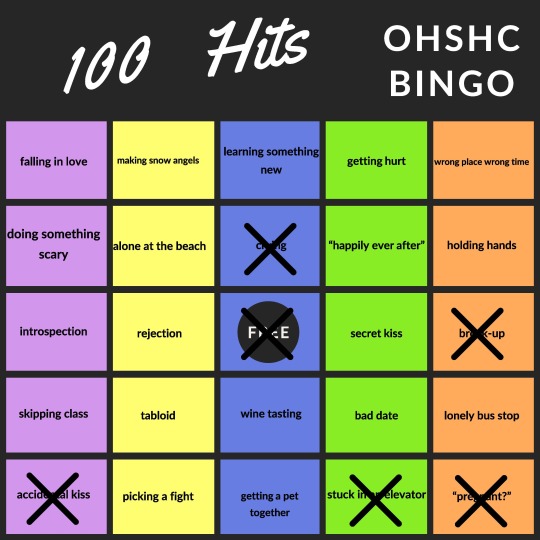
This is my first time ever doing any type of fan prompted writing event for myself and let me tell you I have some thoughts!!
But before thoughts let’s talk numbers.
Start Date: 1/8/2020
End Date: 1/24/2020
Total Fics Created: 9
Total Word Count Posted: 11,935
Prompts Received Anonymously: 5
Prompts Received By Users: 4
Longest Fic: Burning Intentions (2,203)
Shortest Fic: Attorney First, Wife Second (754)
Thoughts:
It was interesting to see which pairs and couples my general audience was requesting. By far the two most popular requests where anything to deal with Kyoya (my OTP) and Mori. You wanted my two favorite boys to get some comfort and happy endings and I was happy to supply them. Now that I step back and look at them, I will give you little fun facts or interesting thoughts I had while writing each one (mostly because I think it is interesting how writers explain their process of writing or their opinions on their own writings). The list starts chronologically from first to last fic posted.
1. Bland Cereal & Pregnancy Brain (Mori x Haruhi)
I imagine that of all the hosts these two will have the closest thing to what Haruhi would deem a normal life. They will make time for each other and always try to check in on each other. If Haruhi wants normal life filled with a steady stream of love then Mori is her guy. I giggled my way through this prompt at Haruhi and her oblivious nature (my favorite quality about her). This prompt took two sittings to complete. The first to write it and second to edit. Overall one of the quicker ones I wrote in this batch.
2. Attorney First, Wife Second (Kyoya x Haruhi)
This fic is one of my favorites that I have written. It is also the first posted fic where stuff gets steamy. I was gasping and eeping the whole time writing their steamy elevator interactions. This story took 1 sitting to write, edit, and post.
3. Solemn Tears (Kyoya x Mori)
As stated in the original post this is the first-ever M/M fic I have written. IT WAS SO HARD. Not because it was M/M but because both characters don’t really ever let their guards down long enough for them to cry. Not only that, I really had to dig and analyze what would really push them to the point that they would cry. Have you ever seen two brick walls cry? Cause I sure haven’t! Their dynamic is interesting and I am glad that I got this prompt to stretch my writing skills. Multiple sittings required because I had no idea how I was going to write it.
4. Shrouded Kiss (Kyoya x Haruhi x Tamaki)
Oh, the angst! Out of all the fics posted this one felt the most OOC. My first thought when I received the prompt was, “Kyoya never does anything by accident.” Haruhi was a little OOC in my opinion but that’s because of how Kyoya proposed the idea of finding love. Do I believe what he says about only knowing once you have tried things with different people? No, but there is merit to say that each relationship and person you are with is going to feel different. Some people are just naturally passionate people while others are more subtle with their love. From what I recall this was a pretty easy write and edit.
5. Obliviously Pregnant (Kyoya x Haruhi)
Haruhi probably couldn’t even surprise Kyoya with a pregnancy even if she tried. She might not have married a doctor but when you marry into a family who is a leader in the medical business nothing will stay a secret for long. On top of that, I am sure that Haruhi is so focused on work that she would actually just convince herself that she is sick rather than being pregnant. Now reader, I know you are curious as to why I decided to bless them with twins. Well, you see…..plot device. That’s really it. Plus, after I asked Google about multiples and pregnancy I was plagued with diaper ads. Note to self, use incognito more often when asking questionable questions.
6. Salmon Side Effects (Tamaki x Haruhi)
This was the first “Free Space” prompt. And I was in the thick of writing and posting. By the time I got to this prompt, I was tired. Not long after I got this prompt I experienced a depressive episode and spent the week slowly crawling out of the pit. I just couldn’t bring myself to work on this fic. I knew I would have to write Tamaki super excited and all I could think about was trying to make it throughout the day without crying. But I got out of the pit and finished it. Multiple sittings needed for completion.
7. Unyielding Devotion (Mori x Haruhi)
I am not sure when it comes to other writers but I cannot read and write fic at the same time. And after binge writing the last few fics I needed a break. I needed to read some fic! One night I was scrolling through FF.Net and decided it was time to start working through my 70+ fics waiting to be read. Picked a fic and I was off to the races (Something Honorable This Way Comes by ilovemori9). It was sweet and wonderful and totally the opposite of a break-up prompt. I think with the break up he was trying to do right by her, wanting her to not be held back by what was required of him. When I first started brainstorming this prompt I was going to have Kyoya lurking in the shadows waiting to take Haruhi as his own but the story wrote itself and it wrote Kyoya out of the story. I think it is better that way.
8. Broken Banner (Mori x Haruhi)
TINY HAMMER! Running joke between @ohshcscenerios and myself. This was such a fun story to write! Once I started I just had to finish. I don’t normally lean towards cute and innocent so it was a nice change of pace. Mori is held in high regard but he is, after all, a high school 3rd year. And he has a soft spot for Haruhi. Also, did you know that Mori is 6’2” while Haruhi is 5’1”? How do you accidentally kiss someone who is a foot taller than you?? So part of the issue in creating this story was how to get their mouths close enough to bump lips. I think the outcome suited the prompt. This was a two sitting story.
9. Burning Intentions (All Characters)
The final prompt….this prompt I tell you what. I will be honest I loathed this prompt in the beginning. I was utterly at a loss as to how I was going to write this. I opened the doc, stared at the prompt and closed the doc multiple times over the span of a week. It was like that episode of Spongebob where he had to write an essay and he felt like he was doing so much work but all he did was the fancy-looking “The”. I almost gave up on it. I almost posted an apology instead of actually trying to write something. In a last-ditch effort, I pulled up Pinterest and searched the word ‘fire’. And then an idea hit me! I wrote part of it one night and finished it up the next day. This story quickly became a favorite because of the witty banter between the hosts. I was laughing at my own writing. I am now very proud of this story!
Final Thoughts & What’s Next?
Throughout the last 16 days, I have accomplished many things when it comes to writing! I went from only having posted 4 fics to now having 13 fics. Today (1/24/2020) on FF.Net Boundless Opportunities (Kyoya x Haruhi) reached 200+ views. On top of the 11,935 words I have posted I have also written an additional 9,124 words for other projects I am currently working on. That is a grand total of 21,059 words written from January 1-24! In my free time, I also finished The Girl on the Train by Paula Hawkins and am 13 chapters deep with The Handmaid’s Tale by Margaret Atwood. On top of everything else, I created a beta profile! I have done so much this month and I want to thank everyone for their support and kind words! They really do me so much to me!
January has been busy! So I am looking forward to celebrating Freedom February!! I am giving myself permission to do whatever I want in February. I still have 11 more paper books to finish as well as 100+ fanfiction stories waiting patiently waiting to be shown attention. Basically what I am saying is I want to spend more time doing other hobbies as well as work on some of my wips that I have been neglecting since I started this project.
Speaking of wips I will be spending February obviously working on my Kasanoda x Haruhi fic but also an idea that sprung up into my head this past week produced a very interesting idea for an AU bad boy fic with Hikaru x Haruhi that has some potential to become another multi-chapter story. Too soon to say if anything will come of it but I want to keep my options open!
TL;DR: January was crazy. Lots of writing. Background information for each fic posted from the bingo prompts. A list of January achievements. Don’t expect me to post anything prolific in February. Using my free time to explore hobbies other than writing. Diving headfirst into digital and paperback stories. Hopefully, make progress on my two main unposted projects. Stay tuned for updates and questions regarding my wips. Thanks!
Special shout out to @ohshcscenerios for helping me out so much! Half of my stories wouldn’t be nearly as good without your help!! Thanks for pushing me to write some fluff instead of just sad angsty fics! Go check out the blog for all your burning host club asks.
If you would like to read any of these fics you can find them on Tumblr, AO3, or FF.Net.
#100 hits bingo#OHSHC#ohshc fanfiction#haruhi fujioka#tamaki suoh#Kyoya Ootori#takashi morinozuka#mitskuni haninozuka#hikaru hitachiin#kaoru hitachiin
12 notes
·
View notes
Text
Recommendation of the Week (07/26/20)

When You Reach Me by Rebecca Stead
Why am I recommending this book?
I read this book a couple times around sixth grade, which happens to be the age of the main character. Someone mentioned it the other day, they were talking about what a great book it was, and I thought, “Yeah, I should do a recommendation for it since it’s really good.” It’s been a while, so I had to reread it, but I think I enjoyed even more this time around.
Plot 1 2 3 4 5 6 7 8 9 10
When You Reach Me is about a sixth grader named Miranda who starts receiving notes from a mysterious person who seems to know everything that’s going to happen before it actually does. While Miranda is trying to figure out what it means, she begins to grow apart from her best friend, Sal, and her mother begins preparing for a game show that could change their lives for the better. At first, it’s very hard to discern the plot of this book. At first, it feels like nothing but snapshots and moments from Miranda’s life that, while interesting, seem to have nothing to do with each other. It’s ingenious how everything comes together by the end, and I noticed way more hints this time around. Also, When You Reach Me has a bit of a fantastical element to it, but it’s not some grand adventure. It’s about seemingly insignificant moments and behaviors and lives that are still so important to the people they involve. Now, I’m a sucker for a good adventure, but it is nice to read some more casual stories.
Characters 1 2 3 4 5 6 7 8 9 10
Rebecca Stead does a wonderful job of developing her characters. They’re all unique and distinct with their own values and little quirks, such as Richard’s right leg, Annemarie’s epilepsy, or Julia’s unnecessarily specific colors. I really liked Miranda. This may have been because she’s a relatable, realistic sixth grader or because her favorite book is A Wrinkle in Time. She’s kind and tries her best, but she’s also naive and inexperienced. To put it simply, Miranda feels like a real person. I won’t talk about each character individually since that would take forever, but I will say that Annemarie and Miranda’s mother were my favorites. I was a bit uncertain about Colin; he seems nice and all, but I don’t see the point in a romantic relationship when they’re twelve. Jimmy can rot in a ditch. Anyway, the connections and relationships between the characters were mostly realistic and really helped develop them and keep me interested.
Writing Style 1 2 3 4 5 6 7 8 9 10
The writing style in this book feels nonlinear. However, despite the jumping from moment to moment, it is completely chronological. Thank you, Rebecca Stead. (If you read my Handmaid’s Tale review, you’ll know I’m not a fan of nonlinear writing.) The big thing about the writing style in this book is that it doesn’t feel like a novel written by a 40-year-old. It feels like a letter written by a sixth grader. “Miranda” is blunt, confused, and she notices all the things a sixth grader would notice. As someone who writes stories but has always written their characters to be around their age, I find it very impressive.
Meaning 1 2 3 4 5 6 7 8 9 10
There are lots of little hidden meanings in this book. Just look at Miranda’s mother-everyone should adopt her political views. I think the biggest message in When You Reach Me is about judgement. Miranda judges a lot of people without knowing them-Julia, the laughing man, Marcus-and there’s more under the surface each time. Miranda judges a lot of people on accident as well; I did mention she was naive. Other people judge her for being poor, and it’s hinted at that her mother is judged for a being a single mother. I think this is why there’s so much detail put into the characters. They’re all individuals that can’t be put into a box, and it would be a huge error to try and judge them at first glance.
Overall 1 2 3 4 5 6 7 8 9 10
To be honest, I was expecting to give this book maybe an eight. I liked it when I was younger, but I love it now. I’m really glad I reread it since it’s so much more brilliant than I gave it credit for originally. The characters have depth and originality, it’s written incredibly well, and there’s a good meaning behind it all. I noticed so much more this time, and I felt a great deal more connected as well. I even got a little choked up at points, and it takes a lot to get me visibly emotional while reading. I would recommend this to people who like realistic fiction, Madeleine L’Engle, and younger protagonists.
The Author
Rebecca Stead: http://www.rebeccasteadbooks.com/
The Reviewer
My name is Wonderose, and you can learn more about me here!
#books#recommendations#reviews#when you reach me#rebecca stead#realistic fiction#science fiction#children’s
1 note
·
View note
Link
A large majority of Americans supports legal abortion, but thanks to gerrymandering and court-packing, the U.S. is now a country politically dominated by a rabid, right-wing minority, one increasingly empowered to simply ignore public opinion.
Because of this, there's good reason to believe it's not just Roe or the legal right to abortion that is on the chopping block. Americans should also be deeply concerned that, with his next Supreme Court pick, Trump will open up a new avenue for assaults on the legal right of women to preventpregnancy in the first place. It may sound like a crazy fantasy scenario straight out of "The Handmaid's Tale," but this legal right that Americans have taken for granted for decades is now on surprisingly shaky ground.
“An extremely conservative justice who would be interested in overturning Roe v. Wade would also be a threat to the right to contraception," Genevieve Scott, a senior staff attorney at the Center for Reproductive Rights, told Salon. “The future of both access to abortion and access to birth control, as well as women’s reproductive rights when they are pregnant, is really on the line here.”
Jessica Mason Pieklo, a law professor who works as a legal journalist for Rewire, mentioned briefly on a Wednesday edition of her podcast "Boom! Lawyered" that she was worried about the fate of the 1965 Griswold v. Connecticut decision and the 1972 Eisenstadt v. Baird decision, which together created the right of privacy and overturned state laws restricting contraception access.
"The contraception decisions are the cornerstones of reproductive and sexual privacy," Pieklo told Salon. "If you really want to undo those protections, it’s not enough to undo Roe, for example. You need to go back and really get to that heart of the right of privacy."
"The privacy right that is recognized in Roe v. Wade," Scott explained, "is actually derived, in part, from the prior decision in Griswold v. Connecticut."
"It’s something that conservatives have been complaining about forever," Pieklo added. "They don’t just say that abortion is wrongly decided. They talk about this court creating a right of privacy where one does not exist.”
As Pieklo said, there's a large body of argument from conservative writers in places like the National Review arguing that Griswold was wrongly decided and that the right to privacy is a fiction. The Federalist Society, which was instrumental in creating Trump's short list of potential judicial picks, has heavily promoted this idea that Griswold decision and the right to privacy are simply wrong.
But it's not just conservative writers who have forwarded this idea — it's judges who currently sit on the Supreme Court.
Chief Justice John Roberts, after he was nominated by George W. Bush in 2005, drew attentionbecause of a draft article he wrote as senior adviser to the attorney general under Ronald Reagan, in which he approvingly cited Justice Hugo Black's dissent in Griswold. As much as one might like the idea of a right to privacy, Roberts wrote, that did not "mean that courts should discern such an abstraction in the Constitution."
In another memo from 1981, Roberts wrote of Griswold that it "devotes a section to the so-called ‘right to privacy,’" and then argued arguing "that such an amorphous right is not to be found in the Constitution."
Justice Clarence Thomas, prior to his nomination by George H.W. Bush in 1991, expressed a similar view that Griswold was poorly decided, and called the right to privacy an "invention." He stuck by this view when it came to Lawrence v. Texas, when he voted against the court majority that held that the right to privacy invalidated laws banning homosexual sex.
Justice Samuel Alito has not publicly inveighed against Griswold, but he did argue, as a federal appeals court judge, that requiring women to notify their husbands in order to get abortions was valid law, and that women had no privacy-right protections against such legislation. He has also been the most actively anti-contraception judge on the Supreme Court, writing a major opinion undermining birth control access and immediately using the arguments in the next contraception case to float the idea of insurance structures that would only serve to end contraception coverage entirely.
All four conservative judges on the court affirmed Griswold as legal precedent during their confirmation hearings, but then again, they also said similar things about Roe. The most that Justice Neil Gorsuch could muster about Griswold was that it was "more than 50 years old." He refused to say anything more, even as he was happy to praise other important decisions, such as the one legalizing interracial marriage.
This question of precedent is even more concerning after this week when, in Janus v. AFSCME, the conservative justices overturned a 40-year-old Supreme Court decision, Abood v. Detroit, dealing with union fees. As Justice Elena Kagan wrote in her dissent, the court majority believed "Abood was wrong," which in normal circumstances is "not enough" reason to overturn long-standing precedent. While that case was about free speech rights and unions, it also signaled that, for the conservative justices, the principle of stare decisis, requiring judges to respect precedent, no longer holds.
In a multitude of minor but important ways, the Trump administration has been trying to undermine contraception access all along. As Salon has been chronicling, federal officials have ramped up efforts to make it harder for women to get birth control. They've attacked publicly funded sources by proposing moving grants away from contraception and sex education programs to programs recommending that women abstain from sex completely unless they wish to conceive. They've also undermined private sources of contraception by attacking federal policyguaranteeing that women's health insurance plans cover birth control.
During a United Nations meeting in April, Trump officials even argued that women don't need birth control, and should learn "refusal skills" instead.
This week, Politico reported that Valerie Huber, a longtime advocate of abstinence-until-marriage programs, has been appointed to lead a strategic planning committee at the Department of Health and Human Services. Huber wrote in 2009 that sex education "was linked to a personal justification of unconventional sexual behaviors." She has also argued that Christians such as herself "should promote Biblical standards in society," applied to believers and nonbelievers alike, and that when it comes to sexual morality that means "God’s standard for premarital abstinence."
As Scott explained, the Center for Reproductive Rights is currently suing the Trump administration for what she called "a backroom deal" to allow the University of Notre Dame to deny female students birth control coverage in health insurance plans the students pay for. The Trump administration is trying to change federal policy to allow any institution to do this, but since it hasn't successfully changed the rule yet, the Center argues this deal is illegal.
“I’m very concerned this is only the first step in ... an all-out attack on women’s reproductive rights by this administration," Scott said.
"I know I sound paranoid sometimes," Pieklo said. "I joke about my Carrie Mathison-like stringboard, but there are a lot of pieces out there."
It's unlikely that the Trump administration or any conservative states will move toward an outright ban on contraception, especially in the short term. Any such attempt would be politically disastrous. But there is reason to believe that with Kennedy gone and a new Supreme Court justice selected by the Federalist Society, nominated by Trump and confirmed by Senate Republicans, the Christian right will feel emboldened to escalate its attacks on contraception access. When that happens, right-wing radicals will likely have the support of conservative judges who never believed women had the right to privacy about their sex lives in the first place.
232 notes
·
View notes
Text
Some thoughts on The Handmaid’s Tale 2x09 - what an episode
The trip to Canada, oh boy I’ve been waiting for this ever since it was first mentioned. We’ve seen what’s happening within Gilead (obv) and we’ve seen what’s going on in Canada but this is the first time we’ve seen the Gilead establishment interacting with the wider world. They’ve been living in their own bubble ever since the new republic was established. They may have been able to justify they’ve fucked up actions within their own little society, but that shit still doesn’t fly elsewhere.
I just wanna point out I love Serena’s lil hat, it’s so 1950s. Plus I actually love the whole costume, I love the silhouette and the way everything drapes. If only it didn’t represent something so awful.
Serena flinches when Fred touches her. That’s really hard to watch. I don’t have sympathy for Serena in any other way, but no one deserves to be beaten the way she was.
The car ride through the streets of Toronto. Serena looks so... enchanted by what she sees, even though this is the type of society that she helped to destroy in the US, the society that she abhorred, that she felt deserved to be razed to the ground in a flurry of violence, blood and death. Now she looks so wistful as she watches people freely go about their day. And I’m struck by the noisiness of the streets, such a contrast to the constricted silence of Gilead. It doesn’t escape my notice that Fred is totally unmoved by the sights. He still has freedom at home in Gilead, so he has no interest.
The schedule made out in pictures, what a moment for Serena. She’s so disappointed by it. The Canadians have obviously done their research and are trying to be culturally sensitive. This is what you wanted, Serena. Maybe she thought that the Canadians would treat her as she used to be treated in the pre-Gilead days.
“I would never betray my country.” “I thought you already did.” God, I fucking love this show.
The confrontation between Luke and Fred has to be my favourite scene of the entire series. The catharsis of seeing someone call out Fred, in a place where he has no power and he has to be courteous, oh my god it was a glorious feeling. At long last, someone who doesn’t have to bow and scrape and can call him a fucking piece of shit to his face.
I am so so so glad it wasn’t just a case of Luke lunging at Fred and then being dragged away. He actually got to tell them all that he is June’s husband, her family. This is the first time Serena and Fred have been forced to acknowledge, albeit internally, that June is still a person – she had a life, she had a family, she had an identity and she still has people who care about her and are fighting for her. They can take her name, her freedom, her body, they can do whatever possible to strip her of her humanity, but they can never fully do it, they can’t erase her past or her connections to others. They can’t reduce her to a blank canvass. No matter what they do to reduce her to a piece of property, they’ll never truly accomplish it.
The look on Serena’s and Nick’s face when they see the picture of Luke, June and Hannah. They both look horrified, though presumably for different reasons. A major theme of this episode and the previous episode has been Serena being forced to come face to face with the reality of what she has done in helping to create Gilead. Episode 8 was Serena coming face to face with what she has done to herself in creating Gilead, i.e. stripping herself of autonomy, freedom, both intellectual and physical, as well as placing herself at the mercy of her husband. This episode was (in part) about Serena having to come face to face with what she has done to other women in helping to create Gilead, and this was done in her experience with Luke.
“Are you thinking about the husband? It was unpleasant, but we soldier on.” To quote Luke, Waterford, you fucking piece of shit.
The scene when the Waterfords are told they are no longer welcome in Canada had me cheering. Erin was right, the letters certainly went boom.
“We believe the women.” “Yesterday you believe me.” God, what a perfect line. I think it sums up not just the mentality of the powerful men of Gilead, but of powerful men in general. It can be perfectly applied to the Me Too movement. Yesterday, sexual assault was as men defined it, so many have responded with anger at the thought that all of their actions have been abusive to women. They feel they should be able to define it, but then we have women who are saying it was/is wrong, they don’t like it and it’s not a respectful way to approach or treat women. Today, it is shifted so that women are the ones that define what is and isn’t okay in their interactions with men.
Fred called the Canadian diplomat a coward. I puzzled over this line, wondering exactly what he meant. I’ve come to the conclusion that Fred called him a coward because he listened to the women and to the citizens of Canada, rather than asserting (masculine) power over them. Wow.
A last tidbit of that scene, when that female Canadian representative tells Serena “I don’t know how you live with yourself. It’s sad what they’ve done to you.” Thing is, Serena did it to herself and Serena damn well knows it. She’s not a victim, she was not stripped of anything, she willingly gave it away and threw her fellow women under the bus. She herself did it. How can she live with that indeed.
A word on Eden: she is a child, and a meek, unempowered girl to boot. She deserves sympathy from the audience, and she certainly has mine. However, at the same time I do find her annoying, and no I don’t think they cancel each other out. She’s not annoying or frustrating for her personality or anything she does, but simply because she is entirely indoctrinated and loyal to the regime that it makes her a liability when it comes to herself as well as Nick. We’ve watched Nick for an entire season, so of course many people have developed a connection with the character so I’m not surprised some have really turned against her. Her loyalty to the regime could get the both of them killed. Though I myself find her frustrating at times, we have to remember that she is a child and she knows no better, she has never lived independently of her family and their views, she had never been able to develop away from that. And Nick is caught between a rock and a hard place in this marriage because she is a child. How could any sane person just erase the fact this is so terribly wrong, and would have been considered a crime had it happened pre-Gilead. It’s an absolute nightmare of a situation.
Does Serena deserve sympathy? When it comes to the physical abuse, yes. When it comes to everything else? No. She’s a very interesting, complex character and she makes me feel a lot of emotions, but the reality of Gilead is self-inflicted, she’s only now coming to realise that and perhaps regret it. We’ll see what happens with June’s baby.
#the handmaid's tale#small power#serena joy#fred waterford#serena joy waterford#offred#june osbourne#luke bankole#nick blaine#eden spencer#eden blaine
164 notes
·
View notes
Text
How to Love a Villain
No, this isn’t a post about Mike. Although I am sure he will be the most excited to read this one.
I am not generally a fan of villains. This includes pretty much any Disney villain from my childhood as well as most villains in TV shows and movies I enjoy. Sure, I can appreciate when an “evil” character is well developed or a villain’s arc is interesting, but usually, it’s my least favorite part of a story.
However, some villains I love to hate. I’ve been thinking about this a lot lately because in the past few years I have actually found a few villains interesting enough to crave more of them. I found that they all share some of the same traits.
I’m going to be exploring these intriguing traits that I view as important in order to create a good villain that consumers will care about. From here, I will be writing separate posts for 5 of my favorite villains and how they encompass these traits.
The Traits:
1) Relatable Character
This is easily the most crucial for me. It’s hard to care about a character that I can’t relate to. Being able to relate to someone is essential for me to feel empathy, the primary emotion that I want stimulated when I consume media. There are many ways to make a character relatable, but really this boils down to a character that is believably human, someone that has realistic strengths and weaknesses, shows emotion, and displays flaws that exist in the real world. Often, this relation is supported by a complicated past, another trait that I enjoy in a villain. Bonus points for characters that obviously suffer from mental illnesses.
2) Capable of Deeply Evil Actions
Sorry to state the obvious, but this is a very important feature of villainy because villains are intended to be, well, bad. Villains must evoke a sense of hate and fear. The audience needs to root against the villain in some way, at least if the heroes are doing their part equally well. If a character displays the ability to act on very evil impulses, this creates the question of how far are they willing to go. This increases the intense possibilities of what the villain is capable of, leaving imaginations free to run wild, and keeping us interested in what they could do next. The eviler, the better, because this provides a sense that anything is possible. To increase the level of loathing aimed at a villain, show these evil acts against characters the audience deeply cares for. The stronger the investment in the situation, the more it matters.
3) Proven to be Intelligent
In order for someone to be truly scary, they must be competent. Being bad isn’t enough by itself in order to plot out, strategize, and carry out evil actions. A good villain must know how to wait for the right timing, how to manipulate others into helping them and be smart enough to plan many steps ahead. If a villain is shown to be talented in many areas, their threat level is increased. I am more afraid of a clever enemy than an enemy that only has pure strength to work with. You never know for sure what a smart person is thinking, especially if they already think in complicated, twisted ways. That’s a deadly combination.
4) Inherently Good Intentions
I believe that nobody is truly all good or all evil. Everyone is flawed, everyone makes mistakes. Few things are better for a villain’s story arc than realizing that all their terrible acts were intended for an honorable reason. This not only adds to the relatable factor but shows a different side of the character, one that gives the consumer hope that they can change with guidance, which leads me to my last trait...
5) Always Keeps You Guessing
From a plot perspective, I feel like this is the most important trait. The longer a story is, the more important this quality is. For example, in a TV show, seeing the same villain follow the same arc over and over again can get dull very fast. Instead, if that character carefully rides the edge of right and wrong it creates an interesting desire in the audience to see the potential of this character working on the heroes’ side. However, a real villain will never fully give up their old habits. This usually comes to light in surprising reveals of betrayal. I feel like this is one of the hardest traits to continually get right and is largely why I enjoy shows with less than six seasons. You can only pull this off so many times and keep it unpredictable.
The Characters I’ll Explore:
- Serena Joy (The Handmaid’s Tale): Oh, Serena Joy. I think she is my favorite villain of all time. Her story is captivating in two ways, I feel sorry for her almost as much as I despise her. The conflicting emotions that her arc evokes keep me yearning for more of her background and I can’t wait to see what she has in store.
- Regina (Once Upon a Time): I would love to carry the confidence that Regina does when she walks into a room. While I didn’t like her at first and felt she was a very cookie cutter version of the evil queen, her arc through the six seasons proves differently.
- Ben Linus (Lost): I can’t even see his face without scowling. This character is so slimy and manipulative that I never want to believe him, but there are many times in the show when believing him is better than the alternative. Lost did a great job of always keeping Ben as an obviously important figure in the storyline, so I never really wanted him to die, but I also questioned why they didn’t kill him whenever they had a chance.
- Joe Carroll (The Following): The MOST charming sociopath. If anyone is capable of creating a cult based on the joy of killing, it’s this guy. He is terrifying but it’s impossible not to be intrigued by his actions. He knows how to manipulate with emotion like an empath, but remains deeply apathetic.
- Thanos (Marvel Cinematic Universe): Thanos is incredibly intelligent but has no idea how insane he is. This creates an interesting paradox between reality and the world that Thanos believes exists. Nothing is more terrifying than someone this out of touch with reality have complete control over the universe, and Thanos is brilliant enough to accomplish just that.
I am very excited to explore these characters further in the coming weeks!
1 note
·
View note
Text
2. the handmaid’s tale

“There is more than one kind of freedom. Freedom to and freedom from.”
rating: 8.8/10 veils
quick summary: In the near/far future, extremist Christians have taken over and forced women into subjugation. They can be Wives, Econowives, Handmaids, Marthas, or worst of all, Unwomen, but in any case they are intended to be silent and exist for men. Our protagonist, who’s been named Offred (because her Commander’s name is Fred), is a Handmaid, which means her job is to get pregnant by whoever her the Commander of her house is. She remembers a past before she was brought from house to house as a Handmaid, and even before she was indoctrinated at the Center - she remembers a husband, a daughter, and her best friend Moira. Offred has a complicated life with the other men and women in her house. She wants to rebel, but isn’t sure who to trust or if she quite has the nerve for it.
highs:
relevant & important themes about women and freedom
The reason I wrote near/far future in the quick summary was because it really does feel like it could be either. I can’t believe that Atwood wrote this book in 1984 and it still feels so modern, which is a testament to her writing but also to deep flaws in our society, sigh (whaddya know, there are still a lot of people who think women should just focus on having kids and be generally more quiet and demand less equality). The idea about freedom in the quote above is an interesting one that readers are asked to consider: that the more free will people are allowed to have, the less free they are of certain dangers. It’s also a chilling look at how fear can be used to manipulate people, to change the way they think and act. An extremist knows how to take a reasonable fear, like disease and contamination leading to less chances of pregnancy/successful births, and somehow make people believe that an unreasonable solution, like making women’s sole purpose to conceive and not allowing them to be distracted by other things like jobs and reading, is the only justifiable course of action. When a person lives a passive life, when they are defined by another person (in this case, men), it’s hard for them to have much power. What will people do to feel like they have power?
a thoughtful, sensitive, complex main character
The way Offred thinks is captivating. I love her habit of thinking in chains of random facts that she notes have no relation to each other. Her contemplations on whether she is in or out or even through time are also very memorable. The subjects that swim in and out of her thoughts constantly and the words she uses to think about them make her pain tangible. Additionally, I like that Offred wasn’t perfect. For example, the husband she reminisced on was the result of an affair. She also later (spoiler!) loses sight of her desire to escape when she starts to get attached to Nick. She’s not quite as bold or brave as her friend Moira, but she’s smart and endearing. She looks at situations and tries to think beyond her own perspective. She’s honest about her own emotions and doesn’t try to repress them even when they’re not quite so honorable. These kinds of main characters feel more real and more believable to me than selfless-hero types.
no one antagonist, imo
This kind of reminds of how after the Holocaust, people at every level of the Nazi Party said that they were just following orders, and it was kind of confusing as to how many levels down we thought they were appeased of guilt. It’s hard to pinpoint one specific antagonist here. Serena, or the Wives? Well, we can see why they’re bitter about being deemed useless as women. The Commander? For the most part he keeps to himself; when he interacts with the women it’s pretty much always dictated by laws intended to raise the population. He also tries to break the rules a little bit. Aunt Lydia, or another Aunt? Even though they’re enforcing and teaching terrible rules, there’s also just a level of pity for a woman who so frequently degrades women for a living. Even sadder if she truly believes it. All the other possible people at fault, the mysterious guards or Angels or higher-ups or whoever, aren’t really given a face or role in The Handmaid’s Tale. They feel far away. It seems like the people around Offred, whether they’re supporting her or conspiring against her, are just acting the way they are because that’s the only way they can bear to live. They need to convince themselves that they’re in control, that they have some power in this life, by pretending they are superior, or that they’re acting from a moral place, or removing themselves from seeing any consequences of their actions. There’s at least one point for every character in the novel I didn’t like when it seemed like they recognized what they were doing wasn’t right, but just tried to cope with the position they’d been given. There are so many different roles needed to maintain the current system of oppression, and I can’t pin the blame on just one person, so it sort of becomes like...everyone’s responsibility? Even Offred, a little bit, for letting herself become passive and accustomed to this way of life. But can we blame her, or any of them, for what they do? Who deserves more blame? I don’t think I can answer, and I like that, because it presents a more complex view of how such a terrible government could rise and retain power.
an ending that gives hope but not a definitive outcome
This is actually really embarrassing- I didn’t actually realize there was an epilogue to this book at first, so at first I actually docked a full point for the way it ended because I thought there was no resolution at all. I felt like the book would have been better if the van had either been to truly take her away and kill her, or if it had been part of the resistance. Like, I didn’t think it needed to go further than that, but I feel like the audience deserved to know that much - one choice would have sent a message maybe about the futility of resisting and importance of being careful, the other choice a message of hope for the future and peoples’s tendency to fight injustice. But when I found the epilogue that all changed! The epilogue is narrated by a keynote speaker at a convention about Gilead, past-tense. So this actually makes it okay that we don’t get to see what happens to Offred. That whether she did or didn’t get to be part of the resistance isn’t as important, because we know that somehow, some people did, because Gilead no longer exists. And her story is just one of many. I’m really satisfied with that ending. I don’t need books to tell me exactly what happens, but I like a sliver of resolution and I’m satisfied with this hope that people were able to break out of Gilead and make it something archaic, something to be studied.
lows:
slightly little confusing worldbuilding
I see the value of slowly acclimating a reader to a new world, but I wish The Handmaid’s Tale had been a little quicker. Perhaps a solid chunk explaining the Marthas, Econowives, Salvaging, etc.? I didn’t find myself fully confident that I’d grasped some of those concepts until near the late middle of the book. At that point it wasn’t fun to try and piece together clues in my mind anymore, it was just frustrating because I had vague ideas but I couldn’t be 100% certain they were right. I get that Offred wouldn’t have been like the narrator of the epilogue, someone who studied Gilead and could explain the society in a scholarly way, but I feel that it wouldn’t have been hard for Atwood to make it a little easier for us without taking away from Offred’s narrative.
tl;dr: This was a thought-provoking read. The power for me was more in the themes and ideas rather than any specific writing style. It was a little confusing at some points, but the message is strong and timely enough that it comes through even when you don’t understand all the details.
#bookblr#book review#book recs#books#the handmaid's tale#margaret atwood#offred#june?#moira#2/?#book marathon#book to book#back to back
3 notes
·
View notes
Text
YBF POLITICS: Don’t Save Them, They Don’t Want To Be Saved

Listen. We’re one sleep away from the election deadline across the country. If that fact alone doesn’t have your anxiety working overtime, then you’re the real MVP. For the rest of us, it’s the crunch time we’ve been waiting for.
We've got some final thoughts. And they don't involve saving folks from themselves (looking at you, Lil Wayne and followers). Leave the people who still believe "protest nonvoters" and the "all the candidates are the same" people where they're at. You and your mental health will thank us later.
There's still many of you voting absentee up until tomorrow and in person tomorrow.
View this post on Instagram
@JoeBiden knows that the key to a strong economy isn’t cutting taxes for billionaires; it’s by lifting the prospects of working Americans. He’s got a plan to create ten million good clean energy jobs, fight climate change, and secure environmental justice. Let’s elect a leader who sees this moment not as a chance to get back to where we were, but to finally make long-overdue changes so that our economy actually makes life a little easier for everybody.
A post shared by Barack Obama (@barackobama) on Nov 1, 2020 at 1:16pm PST
In case you still haven't read it, the Biden Harris ticket has a plan that addresses damn near all of your concerns, if you give it a fair shot. For instance, tired of racist bankers and SBA loan officers having so much power in who they lend money to? This longstanding issue is only being addressed by the Biden Harris ticket.
Despite the tax receipts we didn’t need that prove the current leader of the free world is a whole con-man, there are still people doing Olympic style hurdles to say the Biden/Harris ticket is “no different” than a Trump administration. Let them. They will likely never be swayed to vote for what’s in their own best interest. They’re simply making excuses to allow for another Trump term - whether it’s sexism, being too woke for their own good, secretly being happy about the way they’re benefitting from a Trump presidency, or whatever other reason they could possibly have. There’s no reasoning with or swaying those people, so don’t.
In the words of the rap poet Pastor Troy, “Don't save 'em. They don’t wanna be saved.” It’s time to leave those folks right where they’re at so we can focus on continuing to sway “undecided voters” or those who haven’t typically voted. All 100M+ of them.
View this post on Instagram
We can't let history repeat itself. Don't wake up on November 4th wishing you had done more.
A post shared by Joe Biden (@joebiden) on Nov 2, 2020 at 2:00am PST
At this point, if the Biden Build Back Better Plan is, to you, “what and what” with Trump’s “Platinum Plan” when it comes to their stances on helping Black America, you simply want to believe that, despite the facts proving otherwise. The root of the problem is finally being addressed with the Build Back Better plan, and it’s the getting rid of the racist lending practices for us. All while generating NEW money to pump into black businesses and communities.
Here’s the gist of what you need to know about how Build Back Better ACTUALLY affects our lives. No more of this “but his plan doesn’t explain anything.” That’s B.S. If you actually want to know instead of automatically believing and repeating what others say, here’s what you should know:
To address the racial wealth gap, the opportunity gap, and the jobs gap for Black and Brown people, Biden will launch a historic effort to empower small business creation and expansion in economically disadvantaged areas — and particularly for Black-, Latino-, AAPI-, and Native American-owned businesses. In addition to providing small businesses with an ambitious “restart package” to survive the current crisis and come out the other side strong, he is launching a special, ongoing initiative to empower these entrepreneurs to succeed and grow with a three-prong Small Business Opportunity Plan. His plan is consistent with key elements in the Jobs and Neighborhood Investment Act recently proposed by Democratic Senators Chuck Schumer, Mark Warner, Cory Booker, and Kamala Harris. Biden will:
· Spur more than $50 billion in additional public-private venture capital to Black and Brown entrepreneurs by funding successful state and local investment initiatives and making permanent the highly effective New Markets Tax Credit.
· Expand access to $100 billion in low-interest business loans by funding state, local, tribal and non-profit lending programs in Black and Brown communities and strengthening Community Development Financial Institutions (CDFIs), Minority Depository Institutions (MDIs), and the Community Reinvestment Act.
· Eliminate barriers to technical assistance and advisory services by investing in a national network of cost-free business incubators and innovation hubs and intensive business seminars.
And how much money will be in play for this? $150B of NEW capital for small businesses that have been structurally excluded for generations. This is not existing money supposedly being sent our way.
If folks have an issue with this amount of money going to small and black owned businesses, let them. Most people are silent about tax dollars going to things that don’t help our community in any way. So if some tax dollars go to helping black and brown business owners, so be it.
Re-allocating additional current funds isn’t off the table either, though. Biden is also set to Leverage $100 Billion in Additional Financing for Small Businesses. Why? In 2019, only 10% of funding from the Small Business Administration’s (SBA) major lending programs went to Black, Latino, and Native American entrepreneurs. We haven’t heard anyone else talk about how they plan to address that. (see point #2 above).
Trump’s Platinum plan promising $500B to black people is empty foolywang material. He can't do it anyway. Congress must appropriate the money. Unlike in Biden’s plan, Trump hasn’t named a single member of Congress whose bill he will be promoting.
It’s also important to reiterate, the $500B is not new money. These are federal contracting dollars already available that he’s promising will be allocated. People would still need to go through banks and possibly the SBA – who often use racist lending practices to barely lend to black businesses at all – who face no repercussions if they don’t lend to black businesses and people and pocket the money given to them to reallocate. None of this is addressed by Trump. And seeing that he recently said systemic racism doesn’t exist, you can bet it won’t be addressed ever. This means hardly anyone but his white banker friends will see a dime of that money. So it’s toothless policy even if it was to come into fruition.

No plan will ever be perfect, but you didn’t need perfection from anyone else you are handing over the keys to in other parts of your life. And you have surely found ways to forgive the folks who affect your everyday life - cheating pastors who are leading whole congregations with your tithes you pay, husbands or wives who have made mistakes - whether they have proven they’ve corrected their previous questionable behavior or not. Biden’s and Harris’ records over these last several decades have proven they have evolved with the times and needs of our society. It’s one thing to hold someone accountable for a belief or action from 40 years ago. It’s another to ignore the endless actions they have done sense to course correct, especially when the incumbent hasn’t course corrected a day in his life.
View this post on Instagram
13 cities, 6 days, and a whole lot of people who can’t wait to vote early.
A post shared by Kamala Harris (@kamalaharris) on Oct 29, 2020 at 2:12pm PDT
It does not matter whether you like Biden-Harris or not. Even though we actually do. The important fact is that you do not waste your vote writing in another candidate and vote for the ticket that can oust Trump. This election is about getting him out, yes. But it’s also a referendum on what type of country we want America to be. Some may feel like America hasn’t been a democracy for a long time, but more of an oligarchy. That's fair. But when you have the opportunity to change it, do that. Vote for who has made it clear that making a more perfect democracy is their end all, be all goal. And only one ticket has said it is.
View this post on Instagram
These policies aren’t just the right thing to do — they’re also the smart thing to do for the future of our country. Click the link in my bio to learn more.
A post shared by Joe Biden (@joebiden) on Jul 27, 2020 at 2:24pm PDT
We can’t worry about those who are ignoring the dictatorship forming and acting right before our eyes, and that is being strengthened with a Supreme Court pick whose belief system is rooted in a “secret society” that spurned the idea for “The Handmaid’s Tale”. There’s no way anyone who truly is weighing both sides can come up with a final evaluation that both sides are the same. Those people want a Trump presidency, so let them want that. Far more do not. And it’s time we spend our efforts aligning with the non-voting progressive majority instead.
VOTE NOW. If you have not yet voted, turn your ballot in to a ballot box or your county clerk's office, or vote in person on November 3rd. Both options are now better than mail in voting due to timing.
View this post on Instagram
Make sure your voice is heard. Here are a few reminders to help you as you vote.
A post shared by Joe Biden (@joebiden) on Nov 2, 2020 at 3:00am PST
Protect your energy, and your vote!
[Read More ...] source http://theybf.com/2020/11/02/ybf-politics-don%E2%80%99t-save-them-they-don%E2%80%99t-want-to-be-saved
0 notes
Text
oh boy ok oh boy
a year late with starbucks, here i am with book-and-show sansa #discourse. because i finally watched her stuff in s6 and while i don’t think i have anything #new to all y’all who watched her stuff in s6 as it was airing, i needed to process my thoughts about the entire seasons 5-6 conundrum so here they are.
some structural elements before i dive in:
i recently rewatched the entire series with my roommate who loves the show. she keeps me honest about my thoughts regarding the show because she demands an internal cohesion of me that i tend to be more fluid with online. in that spirit, i’m going to be looking at the characters equally. book!sansa is book!sansa; show!sansa is show!sansa; neither will be written below as sansa. the only instances where there won’t be a show!- or a book!- before any characters name is when that character does not exist in one of the two canons and thus i expect you to know which canon i’m talking about.
i will be discussing--specifically--the information that would cover affc-twow and beyond in book!verse, and the second half of s4-s6 in show!verse. the emphasis will be predominantly on the show, though, with supplementary information from the books where it makes sense for what i’m talking about. while there are still differences between both sansas in earlier books/seasons, i am considering that out of the scope of my thoughts for the sake of keeping my thoughts from going all over the fucking place which--you guessed it--they already are.
my reasons for this are also linked with narrative structure. if you are assuming a structure for both media where you have an a-b-c structure, where a is the first chunk (agot-asos; s1-s4); b is the intermediary getting from a to c, and c is the #final countdown, you must look at b as a complete entity. for a song of ice and fire--and specifically sansa’s case--it’s easy: she doesn’t appear in half of the b section (affc-adwd; though when twow comes out we may have to adjust this assumption of the b section, i think it’s a fair assumption to make now) since she does not have a pov chapter in adwd. for game of thrones, it requires looking at s5 & s6 in tandem. i honestly do not think it’s fair (in either direction) to judge s5 without looking at s6, and i do not think it’s fair to judge s6 without looking at s5. they comprise the same narrative chunk.
i wear my biases on my sleeve: i think that s5 was a revelation in terms of the showrunners really being complete fools when it comes to confronting major adaptational challenges that they were facing. while i do not--and honestly have never--expected perfection from them in terms of a perfect page-to-screen adaptation, this season to me was a sign to me that they were not equal to the task facing them. this is not to say that martin is: the jury will be out until we have twow and possibly ados in hand.
to me (and this does not mean you have to share this opinion), a good adaptation is not whether or not characters’ lines are reflective of the book, it’s whether the grander theme of the adaptation matches the original’s. it’s a metric i use for all book-to-film adaptations, be it the lord of the rings, the handmaid’s tale, harry potter, american gods, the various pride and prejudice adaptations, and whatever else the film industry throws at us next. this is an unfortunate metric for game of thrones, however, because the showrunners hamstrung themselves fast on that front, and it’s something that they even admitted to when saying “Themes are for eighth-grade book reports.” [source]
thinking something is a (not-)well-done adaptation and thinking something is a (not-)well-done show are two completely different things in my mind. i don’t necessarily think that the harry potter movies are good adaptations; i think they’re decent movies--and the later ones are even full-on good. in the case of show!sansa and the storyline constructed for her, and looking at them not as an adaptation but as a creation, here is what i will be considering
does the character make internally consistent choices?
are the choices the character makes substantiated by their experience?
how does the character fit in with the larger story?
lastly, this is a critique of seasons 4-5-6 of game of thrones. i understand completely that there are folks out there who prefer game of thrones to a song of ice and fire; i know there are folks who prefer a song of ice and fire to game of thrones (i am one of this latter crew). this is not meant to be a value-judgement on what you find enjoyable. you do you. i’ll continue to do me, and i do have major criticisms of various narrative arcs and setups in the books, though, due to the differences between the two media, they tend to be of a different variety. if you don’t feel like reading through a long critique of this arc (because god knows there have been enough of them at this point since i’m a year late with starbucks) by all means skip this one. i am processing for my own sake, and wanted to share what i think in case it’s constructive for others who haven’t had it already with the books-vs-show discourse on this particular arc.
a point that doesn’t easily go anywhere: a major difficulty when encountering books-vs-show, with really any of the characters but in this specific case definitely so: age. book!sansa is 13 going on 14. show!sansa is at least 18 if not older. the difference between how a 13 year old would behave and process and how an 18+ year old does behave is vitally important and rarely discussed. for all my frustrations with benioff & weiss’ adaptation with the series, i wonder to what extent (and i mean i literally wonder--i can see it going many ways) a lot of the deviations from between book!- and show!sansa comes from their respective ages.
show!sansa & rape
show!sansa was raped.
she was raped on her wedding night to show!ramsay, and was raped repeatedly and psychologically and physically abused afterwards. at the time that the episode aired, there were many comments flying around, but especially you have the following comment from brian cogman, one of the lead writers on the show:
“This isn’t a timid little girl walking into a wedding night with Joffrey. This is a hardened woman making a choice and she sees this as the way to get back her homeland. Sansa has a wedding night in the sense she never thought she would with one of the monsters of the show. It’s pretty intense and awful and the character will have to deal with it.” [source]
there are two things i want to unpack from this quote; i’ll get to the second of them in a different section. the first part i will fixate on is one that frequently gets fixated in on in discussions of season five--specifically that show!sansa’s wedding night is one of “a hardened woman making a choice.”
the problem we have here is that we don’t see her “making a choice.” there are many discussions to be had about the nature of agency within westeros--both in the books and in the show, and involving characters beyond either book!- or show!sansa--but it is fairly certain from the beginning that show!sansa does not have a choice in the matter. from the moment that show!petyr brings her away from the vale (not even telling her where she is going) and then surprises her with the view of the north at moat cailin, it is clear that he is not interested in her “choice.” the “choice” that show!sansa has to make is what to do with her newfound situation--which she had no hand in choosing.
one of the seminal issues with season 5 is the way that benioff and weiss ended season 4 for show!sansa--specifically they had her looking at show!petyr and saying “I know what you want,” and then had her descending the staircase in the vale in a dress of her own making, hair freshly dyed, and seemingly liberated after three seasons of captivity in king’s landing. this makes the transition into season 5, where you have a show!sansa who is distraught in episode 3 at the concept of going north to the boltons, who is blindsided that show!petyr would have masterminded this for her--inconsistent with the end writing of season 4, and with the commentary on the show from the episode where show!sansa did say “I know what you want,”
“Up to now, Sansa has been a piece that other people have moved about the board to achieve their own goals, using her, discarding her, using her for a different purpose, you know, ‘You’re gonna marry Joffrey.’ ‘No, you’re gonna marry Loras.’ ‘You’re gonna marry Tyrion.’ She is beginning to at least try to understand how she can play the game of thrones and be, not a piece, but a player with her own goals and moving other pieces around. And she’s not a warrior like Robb, Jon Snow. She’s not even a wild child like Arya. She can’t fight with swords, axes. She can’t raise armies. But she has her wits, the same as Littlefinger has.” [source]
perhaps, instead, it was arrogance; alternatively, it is hubris that she assumed she knew what show!petyr wanted; or perhaps she is not in fact a player (to use terminology that is based in book!sansa’s arc), but still a piece, and a piece whose player has misread the board--show!petyr telling her “Better to gamble on the man you know than the strangers you don’t. And you think you know me?” could well be mocking of both her and her strategy for he himself is about to gamble on strangers he doesn’t know--and drastically so. that’s a valid interpretation of the beginning of season 5 in my view, but it stands at odds with her trajectory in the second half of season 4, while being consistent with her trajectory in season 6--where you can argue that show!sansa does begin to emancipate from piece-dom to player-dom. this is something even sophie turner made note of while discussing season 5:
When I got the script, I was shocked to my core. Because I was just like, is this really going to happen for her again? It’s really quite devastating. It is “Game of Thrones,” but when you had the moment at the end of Season 4 you think, “Oh her life is going to get better. She’s going to take matters into her own hands and she’s gonna be this powerful woman and liberate people and manipulate people.” And then it was just kind of like, “Oh.” [source]
regardless--this makes the setup to this entire arc a rocky one because even the actor involved feels as though it’s a major step back for the character. it makes the characterization inconsistent since it doesn’t seem to follow naturally from the end of season 4 and thus how the viewer comes to see show!sansa in the a section of the narrative. it makes the justifications for the need to have her fill the role of show!ramsay’s wife and rape victim seem all the more nonsensical.
benioff’s commentary is revelatory on the matter:
“Sansa started as such a naive innocent...She’s been traumatized by what she’s seen and she spent almost a couple years in shell shock. At a certain point she’s either going to die or survive and become stronger. She’s chosen the latter option and she’s learned from an incredibly devious teacher in Littlefinger. The interesting thing about Littlefinger is he seems to have no almost no weaknesses aside from his affection for Sansa. He’s been obsessed with her since that early episode at the joust.” [source]
the tricky thing about this comment is that it has two theses: the first is that show!sansa’s only options are “to die or survive and become stronger.” this comment in and of itself is not one that is necessarily untrue: book!sansa, after all, definitely spends the course of several books trying to figure out how to survive the situations she has found herself in, noting even that “one slip and [she is] dead,” even after she has left king’s landing. it is certainly true of show!sansa, who during her time in king’s landing definitely was playing a game of survival and one the likes of which she in season 1 would not have imagined.
what is frustrating is that the idea that this version of “survive and become stronger” was not something that they had already set up at the end of season 4, that show!sansa has thrown herself in with show!petyr and is prepared to outflank everyone for show!petyr has “almost no weaknesses aside from his affection for Sansa.” she exited season 4 with that “survive and become stronger” mentality, only to have it torn to shreds in season 5. the idea, then, that show!petyr’s affection for show!sansa would blind him into sending her to this specific marriage reflects that he does--in fact--have a weakness (his own hubris) and that, furthermore, show!sansa’s strength (which, quite apart from “shell shock,” was what carried her through seasons 2 and 3) came not from her trying to take advantage of her situation as she was at the end of season 4, but rather from her being raped instead. independently about what that means for the character, it says rather a lot of misogynistic things about the showrunners.
i stand firmly believing that the showrunners mishandled show!sansa’s rape. i do not particularly think they handled the episodes immediately following her rape in a consciencous way, though i think they do manage to capture show!sansa’s nihilistic desperation at her situation which leads her to insult show!ramsay to his face and to leap off the walls of winterfell with show!theon, both actions that display a brash bravery that she is rarely credited with (either because insulting show!ramsay to his face is deemed “stupid” and “dangerous” because he will abuse her further, or because it stands at odds with the idea of show!sansa as one who waits, and thinks, and uses her wits before acting--a trait that is frequently talked about in commentary of the show). to stand up for oneself against a rapist, abuser, and--beyond her relationship with him--torturing murderer and to declare that this is an unacceptable situation to exist in is an act of profound backbone.
the simple fact of show!sansa unflinchingly and unapologetically overseeing the death of her rapist and the man who murdered her brother is the only way to have ended that subplot. it was a good ending to a storyline that was shoddily structured in both its preparation and in its early execution.
show!sansa & the north
“This isn’t a timid little girl walking into a wedding night with Joffrey. This is a hardened woman making a choice and she sees this as the way to get back her homeland. Sansa has a wedding night in the sense she never thought she would with one of the monsters of the show. It’s pretty intense and awful and the character will have to deal with it.” [source]
i mentioned above that i would have a second thought about that quote. here it is. the point of show!sansa going north to marry show!ramsay was to get her north. her “choice” was to try and reclaim her homeland, however she could, after having been separated from it and her family for so long while held in captivity, and after having mourned and longed for it during that brief period in the vale of arryn.
both sansas are characters who want to go home, who long for paths to bring them home, who miss their family. book!sansa assumes that the vast majority of her family is dead (it is a shock for book!sansa to remember that book!jon is alive--the sole family member from her nuclear family still remaining to her; she has an uncle and a great uncle in the riverlands, but those don’t cross her mind particularly, possibly because they are tullys and not starks) and is completely unaware of what the reader knows is going on in winterfell (which book!petyr is involved with by virtue of jeyne poole’s presence there). meanwhile, show!sansa knows that arya lives, learns from show!theon that her younger brothers are alive as well before physically reuniting with show!jon early on in season 6.
i completely understand the need to change the way that martin has been writing his story in order to fit the constraints of television, and the story that the showrunners have been working on since the first season. i understand, furthermore, that while martin has the luxury of being able to miss every deadline set before him for whatever reason he sees fit--that’s not something that benioff and weiss are able to do in order to write a season of game of thrones.
if it were simply a matter of show!sansa working to reclaim the north, i would have many fewer quibbles with the execution of this storyline. the problem is that that the emphasis of season 5 (and thus something that they had to fix in season 6) was not the north; it was the rape.
The showrunners first thought about putting Sansa and Ramsay together back when they were writing season 2. “We really wanted Sansa to play a major part this season,” Benioff said. “If we were going to stay absolutely faithful to the book, it was going to be very hard to do that. There was as subplot we loved from the books, but it used a character that’s not in the show.”
Writer-producer Bryan Cogman had some insight, as well. “The seeds were planted early on in our minds,” Cogman said. [source]
there are many elements to the subplot that they chose to adapt that were not present in season 5. the major elements of the subplot that were present involved the marriage of show!/book!ramsay and the horrificly abusive marriage that that becomes, the psychological grapplings of show!/book!theon, and show!/book!stannis’ march from the wall to winterfell (though there are major differences in the adaptation of this march; i won’t be discussing them here). the problem is that while all of those are vitally important to the book plot, the reason that they are all there in the books to begin with is the power vaccuum of the north following book!robb’s death--and none of them would be present without the political pressure of what is going to happen in the north, and that is the vital backdrop of everything. it is startlingly absent in season 5 and has major ramifications in the writing of season 6, especially for show!sansa, though also for show!jon.
in the book iteration, you have the northern lords who have gathered in winterfell for the marriage of book!ramsay with jeyne poole. the marriage is a way to legitimize bolton rule, since one of the “stark daughters” will be married to book!ramsay before all of the north, making it that much more difficult for them to rally against the boltons and say that their rule is illegitimate. one of the many points of the subplot (and certainly one of the most important) is that it happens where everyone can see it, and yet book!theon is the only one who knows all the details.
the northern lords--for the most part--are disgusted with the entire situation. they are livid with book!theon for having (supposedly) murdered book!bran and book!rickon, they hate the boltons for being turncloaks who participated in the red wedding, where many of their brethren were slaughtered (not to mention the starks who died there), but they are also fully aware that many of them still have living family members who are held hostage beneath the twins and so they must make nice with their new lords, lest something bad happen to their family members. it is in this subplot that we have some insight into seeds laid in book!davos’ storyline--that wyman manderly is working to undermine the boltons and the freys, that there is someone in winterfell who is murdering turncloaks (though that person is unknown), and that “the north remembers” what happened to the starks, to their own families, and that they hate the boltons for it. furthermore, they are flatly disgusted with book!ramsay’s treatment of jeyne, whom they believe to be book!arya.
“Not me,” the Lady of Barrowton confessed, “but the rest, yes. Old Whoresbane is only here because the Freys hold the Greatjon captive. And do you imagine the Hornwood men have forgotten the Bastard's last marriage, and how his lady wife was left to starve, chewing her own fingers? What do you think passes through their heads when they hear the new bride weeping? Valiant Ned's precious little girl.” [source]
the show’s adaptation of this scenario does not include the northern lords. it mentions--briefly--ramsay terrorizing the old lord cerwyn and replacing him with a new one in the first episode of season 5, but after that we have literally nothing for an entire season. the only sign that “the north remembers” comes from a little old man and a little old woman who ally themselves with show!brienne and show!sansa. indeed, this brave woman ends up being murdered and flayed by show!ramsay after he discovers her plans to help show!sansa escape and that, it seems, is that. “the north remember[ing]” seems to be a flimsy, hopeless thing, and not enough to help show!sansa at all in her current situation, for it cannot connect her with show!brienne (present and earnestly hoping to help show!sansa, if unaware of the explicit details of her situation).
stepping away from the issues that arise from adaptation here and looking at game of thrones without a song of ice and fire to compare it to--in order to be sure that show!sansa was isolated enough for show!ramsay not to worry about having to rein himself in, the showrunners left several major worldbuilding plotholes and really shot themselves in the foot for the next season and the character development they could have had for show!sansa. for all they say that the “choice” that motivated show!sansa’s actions was an attempt to reclaim her homeland, their focus in this arc for an entire season was her abuse, and then her desperate need to escape from it, not her political aims. rather than giving show!sansa scenes where she was interacting with lords and ladies she would have to convince in season 6 to join her cause, scenes where northern lords might see how show!ramsay truly was treating their beloved show!ned’s daughter, or where they might be appalled that show!sansa would agree to marry him, or whatever could be written to add in conflict later, they gave show!ramsay pointless scenes with his girlfriend, a poorly contrived plot involving being able to see a candle in a tower window, and an isolation that made no political sense given that the whole reason that show!sansa married show!ramsay from the bolton perspective was to legitimize bolton power in the north. they did not care to focus even a little bit on the rest of the north and showed literally no perspective on the match from any northern characters. it was only show!sansa and the boltons.
the trouble is--the rest of the north does exist, and show!sansa (and show!ramsay) has to confront that in season 6, since it was not done in season 5.
the first thing to bring up before diving into that, though, is the red wedding. the red wedding--in both books and show--was an event orchestrated by the rooses bolton, the walders frey, and the tywins lannister. in both cases, you have an event where the robbs and catelyns stark were slaughtered--but also where members of other northern houses were slaughtered and/or taken captive. this is vital to the frustration of the northern lords in the book as described above. they blame the boltons far more than book!robb for the red wedding, not least because many of them still have family members held hostage at the twins, pending their allegiance to house bolton’s regime in the north. they recognize book!roose as a traitor, and that book!ramsay is his son and heir and thus as vile a kingslayer and traitor as they could find, on top of being the fiend who married lady hornwood and then left her to starve to death and eat her fingers so that he could claim her lands through marriage as his own. it is not simply a matter of being frustrated with book!robb’s choice to marry jeyne westerling (though there is definitely frustration there)--they know that the destruction of--not just their king but their autonomy rests on bolton shoulders.
the northern lords in the show, far from blaming the boltons, seem to blame the starks for it. they blame show!robb’s marrying talisa and shirking his commitment to marry one of show!walder frey’s daughters. and while i think, given what happened at the red wedding, it is justifiable from their end to see their king as having not taken his oath seriously, the leap from “show!robb did a bad thing” to “the kinslayer of the kingslayer of show!robb now sits in winterfell and should sit in winterfell” makes legitimately no sense as a baseline for why northerners would side with show!ramsay and it is the baseline.
there are, of course, logical explanations to why many of the northern lords chose to absent themselves from season 5, and to help substantiate the decision season 6 in aligning with the boltons (even the ones who want to “stay out of it” have chosen house bolton over house stark). the problem remains that none of those explanations happen in the show canon until season 6, making it impossible to deny that season 5 wasn’t about the north it was about rape. there is no dialogue to explain it, and there aren’t any of benioff & weiss’ much beloved monologues to explain it and, given how frequently they use monologue to provide political backstory/understanding to their viewers, the lack of it in this plotline which is supposed to be about show!sansa “see[ing] this as a way to get back her homeland” is really noticeable. there are explanations for the choices, but those explanations must come from the viewers, not from the show itself, which makes it no more or less canon than the questions demanding to know why the north did or did not remember in this way.
it means that the northern plotline has to play catch-up with itself in season 6 and that show!sansa shows an understanding of the north and its politics that were denied her by the showrunners not sending any northern lords to winterfell in season 5 in the first place. her understanding of the north was that brave woman’s assertion that “the north remembers,” and it gets flung in her face repeatedly when she brings it up. and while it would make sense for her to have some instinct for politics after her time in king’s landing and her time with show!petyr, and for her to understand show!ramsay better than show!jon and show!davos in anticipation of the battle of the bastards, it doesn’t make sense that she would have a better sense for northern politics as a genre than show!jon, who has been much closer at hand to the north than she has since the beginning of the show by never having left it and who has had to deal with a northern political backdrop given his stance about the wildlings since season 2.
the first instances of northern lords being present in winterfell are a karstark and an umber. the karstark’s justification for supporting ramsay makes sense, even if it’s belated: there’s a great deal of bitterness for show!robb’s beheading of show!rickard karstark in season 3. it’s a clunky scene but it follows from what came before. this is not even a little bit the case with the umber who brings show!osha and show!rickon into show!ramsay’s hands. the scene in which this umber is showing that he supports show!ramsay follows literally no logic. the reason for support is that show!ramsay slew his “cunt” of a father. what made show!roose a “cunt” is hard to say--it’s never explained. perhaps, it’s that he slew his king in cold blood; if that’s the case, one wonders why a man who kills his king is worse, somehow, than a man who kills his father in plain view of his vassals. but that is speculation. there is no mention of the red wedding (where presumably show!greatjon was...but who knows because he hasn’t appeared since season 1), of the betrayal of the starks and the umbers’ fellow northern lords by the boltons, and no real understanding of why show!rickon and show!osha, who presumably have been in last hearth since the end of s3 when they said that was where they were headed, would go from being people who deserved protection to prisoners of the house who slew show!robb and show!catelyn.
the only conclusion that can be drawn, given the lack of setup for it, is that benioff and weiss were ramroding their plot into place, just as they did by sending show!sansa north to begin with, and are trying to convince the viewer to “just go with it” in order for the rest of the season to make sense and to have the military setup they so desire for the battle of the bastards in episode 9. in focusing only on show!sansa’s rape the season before and none of the northern politics, we then are left questioning why the everloving fuck the karstarks and umbers think the manderlys would throw in with show!ramsay when benioff and weiss were so proud of having a manderly at the red wedding (presumably to die or be captured) to when season 3 aired. it does not follow logically or politically--it only follows if you stop assuming that this house, and other northern houses, has any memory, agency, goals, familial relationships, and has miraculously lost the sense of honor that led its members to crown show!robb following show!ned’s beheading and that they only exist as a function of show!ramsay’s power in the north...and the whole point of show!ramsay’s marrying show!sansa was that the power he held in the north was unstable to begin with.
ironically, the lord glover that show!sansa and show!jon have to try and convince to join their side gives a better justification for it than either of these two more powerful houses--in pointing out that show!ramsay helped retake his keep from the ironborn, and that show!ramsay helped him rebuild his home (which....he didn’t need to marry show!sansa for, and which is a very different tune from show!roose’s warning to show!ramsay in season 5 that “We can't hold the north with terror alone”). his refusal to help show!jon given that it is an army of wildlings show!jon’s asking him to join also makes sense, but it is so belated and following so contrived a setup that it feels like an afterthought for the baseline above, rather than the primary motivation of mistrusting show!jon’s choices. but at the same time, this lord glover does address the fact that it was the boltons who perpetrated the red wedding which destroyed the lives of so many including his brother, pinning the blame on show!robb and his choices instead. it perpetuates--rather than the boltons being hated for turning their cloaks--the idea that they might, in fact, be liked for it which is so mindboggling when you also have this mentality that “the north remembers.” treason and kingslaying are suddenly oddly forgivable in a region that prides itself on having an ancient honor.
the viewer has been given the sense since the very first scenes of the show that the northerners care intensely about the old way, about righteousness and justice. but what we see from the northern lords--or rather, from the lack of the northern lords in season 5--stands at odds with the starks and the northern “old way” of making justice with their own hand. show!sansa and show!jon alone seem to remember it, seem to care about the boltons and justice for the red wedding. the rest are unwilling to help, and the reasons that they give do not align with what the viewer has been led to believe about the north in the a section of game of thrones. if it does remember, it remembers the wrong things and is better to think that, in fact, it might not.
and--to make the whole mess even more frustrating--in the scene in which show!jon is crowned the king in the north, the northern lords speak of how he avenged the red wedding, which they had seemed to forget or not care about in joining the boltons or rejecting show!jon’s and show!sansa’s call for aid. little show!lyanna mormont declares that “the north remembers” to murmured assent and that’s true: she did. the others--they made it quite clear that they didn’t remember the red wedding or the horrors that show!ramsay was capable of throughout the entire season.
show!sansa & herself
now is where i’m going to shed commentary from the showrunners for a section. the reason being that in order to look at show!sansa as her own character--no matter what my frustrations are with the crafting of her arc--it is a waste of energy to compare what the showrunners intended for her versus what was actually depicted on the screen. it means that book!sansa in the vale, grappling with the web of lies she’s found herself in, must cease to exist for a time, and that benioff, weiss, cogman, and martin do not get to say a word. only show!sansa does.
show!sansa begins calmly confident in her choices, since the end of season 4 ended with “i know what you want,” the dyeing of hair, and a confident stroll that implies that show!sansa is ready to take control of the situation. that calm confidence slips away very quickly when she finds that she has been sold into marriage as she was by show!petyr and finding herself in the wolf’s den with those who slaughter wolves.
it results in an understandable, natural irascibility. show!sansa in her newfound freedom is infuriated by the presence of the boltons in her home. she speaks and acts boldly. she seems to have forgotten everything she learned in king’s landing, that the viewer spent several seasons watching her navigate with enough capacity for her to have made it out alive--with show!petyr’s help. show!sansa knows the boltons to be terrible for they murdered her mother and brother; show!sansa knows that they have the capacity for craftiness, for their betrayal was not discovered before it was too late. and show!sansa behaves almost as show!ned did in season 1: speaking her mind and damn the consequences. perhaps she is trusting in the fact that show!petyr, her ally, made the match for her; perhaps she is trusting in her name and status as a legitimization of show!ramsay’s position to serve as a protector for her. perhaps, still, she is determined that in this place, in her home, in winterfell, she will not be the sansa stark who had to hide everything about herself in order to escape abuse at show!joffrey’s hand. she is determined to retain a part of herself no matter what. as she tells show!theon in the last episode of season 5 “If I’m going to die, let it happen while there’s some of me left.” she is not there yet, of course, but i think this line is vital to understanding her earlier behavior in the season, especially when considering her history in the a section of the narrative as an abuse victim who was never allowed to be herself and who routinely had to denounce her father, brother, and mother as traitors, and tell everyone who would listen that she had the traitor’s blood also.
show!sansa is allowing herself to be “herself” as best she can, which is jarring for a character who has existed to be different versions of herself depending on those around her and what they need from her. this version of herself is an impulsive one ( “You can’t!”) and one who digs into her abuser where she can (“Or maybe he’ll give me yours”). the viewer knows more than show!sansa does: we know what show!ramsay did to show!theon, we know that show!ramsay has literally hunted like game a woman who no longer pleased him and set his dogs loose on her to kill her, we know that he is a different breed of cruel from show!joffrey. but show!sansa does not yet. she will learn all this--she will see hints of it when she finds show!theon in the kennels--thinking that he deserves his state, given that he supposedly murdered her little brothers--but she will not learn for true until after she is married.
she marries show!ramsay, is repeatedly raped and beaten and abused psychologically by him, and she tries twice to convey to show!brienne that she needs her help, that she needs to get out. both are failures that result in the death of others: in one case, the old woman who told her that “the north remembers,” the second in show!myranda, whom show!theon kills before he and show!sansa leap to their freedom and potential death from the walls of winterfell. the progression of season five, for me, is a smash repeat of seasons 1-2 for show!sansa, only this time for an older woman with an older abuser. she thinks things will be fine, they are not fine, she is sexually and psychologically abused. there is even the hope that show!stannis will kill her captor for her which happens on neither count. the difference is capacity for agency: show!sansa in seasons 1-2 was thirteen-fourteen years old and is being watched very closely at all times in a place she doesn’t know very well. in season 5, she is a stark of winterfell in winterfell and is able to slip out of the room in which she is being held and sneak her way to try and transmit her plea for help. and, when she is unsuccessful, she chooses to leap from the walls with show!theon, rather than choosing to stay in a space of abuse. in king’s landing, there remains some hope for her--that show!robb will live and come to find her--in season 5, whether or not there is hope for her safekeeping doesn’t matter to her. she’d sooner try all she can to get free.
there are inklings of show!sansa’s pride throughout season 5. i should note: pride here is not intended as a value judgement for show!sansa, though frequently it is used against her. i think she is entitled by her experience to have her pride. people have tried to strip it from her throughout the seasons. her holding onto it, even when it causes conflict, i think is a sign of her tenacity in light of abuse. she is proud when she arrives in winterfell, head held high to face show!robb’s and show!catelyn’s murderer and his son, she is proud before the wedding while dining with the boltons, refusing to be brought low, she is proud in interactions with show!theon before she is married, and she is proud enough to say that she’d rather die while there is still some of her left than to return to her chamber and face whatever show!ramsay has in store for her. that pride takes on a different shade in season 6 when she finds show!jon at castle black.
there, her pride becomes more mixed. it flares at random moments. sometimes she is proud in a way that includes show!jon--making him a cloak like their father’s, for example--and other times she is proud in a way that doesn’t include him. show!sansa’s pride, to me, helps explains why she doesn’t tell show!jon about her contact with show!petyr when he first comes to molestown to see her, and then returns to the knights of the vale at moat cailin. she doesn’t want to admit to any contact with him, because it is both painful and humiliating to acknowledge that show!petyr has anything valuable to convey to her after what he was responsible for in season 5. it is pride as well that means she doesn’t tell show!jon that she is sending for the knights of the vale after house after house after house has closed their doors to the starks’ plea. show!sansa has been told that “the north remembers” by the brave old woman. there were no other northern lords in winterfell to prove otherwise while she was there as well. she clung to it as hope in her most nihilistic moments and now that hope has been turned on its head and it is something she refuses to accept because she’d rather die than go back to ramsay--so she calls upon show!petyr. it can only be pride that keeps her from telling show!jon, fear that he will call the move stupid, that he will call her stupid for trusting show!petyr in an hour of need.
and, of course, it is pride that leads her to reconnect with show!petyr wordlessly when show!jon is crowned: if show!jon gave her credit privately, no one gave her credit for helping to retake winterfell during that meeting--not even her half-brother--no one except show!petyr and her pride is wounded and he is planning to prey upon it once again.
show!sansa & the larger story
while drafting this, i reread the post that i wrote in the immediate aftermath of unbowed, unbent, unbroken. it, like this, was a processing post, though of a very different variety, and it, more than this, was expecting a tighter adaptation to the books. one of the major points that i was making was that, in sending show!sansa north to fill the role in this subplot, there was a major ripple effect in the larger story--beyond just what happened in the north. this ripple effect struck out as far as dorne, for that was where show!jaime found himself in season 5, rather than in the riverlands where his book counterpart was. book!jaime would be lured away by book!brienne on lady stoneheart’s orders while book!brienne is still on her thus-far fruitless quest to find book!sansa. because of the adaptation of show!sansa’s storyline, you can’t send show!jaime to the riverlands just yet (this will happen in season 6) so instead he goes to dorne, which changes the dynamic of his and show!cersei’s relationship, which changes the moves that show!cersei makes, which changes the moves the faith makes. you also have show!petyr who inexplicably tells show!cersei precisely where show!sansa is and why and somehow doesn’t end up dead but instead gets show!cersei to agree to name him warden of the north at the end of everything (an additional interesting layer to his shared glance with show!sansa at the end of season 6).
the trouble i find here is simple--and to me much shorter than any of the points i’ve made above--the decision to send show!sansa north in season 5 is directly connected in my view to the dorne subplot was poorly conceived on every possible count (“i’m going to honor my dead lover by....killing his entire family....” + badly shot fight sequences). and while i think that the king’s landing plotline in seasons 5 and 6 was better upon a rewatch than i was anticipating it being, i also think that there are major gaps in it and in how the north is being treated by a show!cersei who is doing what she can to consolidate her power, especially a show!cersei who has just lost the second of her three children and who believes that one of those responsible for the first’s death is in the north.
i think that more broadly, the writing and worldbuilding in season 5 went downhill; i can’t parse out if i think that’s because of the northern plot, or if it’s simply a correlation. it’s hard to know since it’s the first season where they depart so thoroughly from the books, which makes it hard to know until the winds of winter has been released and until game of thrones is finished as a television series. in terms of the show independently from the books, however, i think it’s undeniable that season 5 is a weak point and that the victories of season 6 are still built on a bad foundation which makes them harder to see as full-on victories. you can’t leave out season 5 (unless you’re talking about show!bran since he--mercifully?--wasn’t in season 5) in terms of talking about narrative because it’s the linchpin and it’s a bad linchpin. it’s how you get from a strong start to a--hopefully--relatively strong finish.
final thoughts
looking at show!sansa in a vacuum (ie pretending for a second that book!sansa does not exist), i feel just plain bad for what the writing of her was. it was hamfisted, unsubtle, poorly conceived, and poorly executed. it frustrates me that a narrative arc with all of those traits has a ripple effect on the narratives in the rest of the series, but that’s how it goes i suppose.
i’m proud of some of her choices: i will never not be thrilled by the way she #ended show!ramsay, and i’m curious about what show!bran’s return to winterfell will mean for her. i’m frustrated with some of her characterization, but lbr here are there major characters on game of thrones whose characterizations i adore? because for the most part the characters i am at my happiest watching are the minor ones these days because most of the major ones are inconsistent in a way that personally is very frustrating.
i don’t really know what else i think.
i also don’t think i have to. i don’t know if i will until the show is over. and i imagine that my thoughts will continue to grow and change as time goes on because that’s what thoughts do. i literally could not have foreseen writing some of what i’ve written in here two years ago when season 5 was airing.
but i suppose all this is where i am right now.
#books vs show#show sansa#sansa#the show#a year late with starbucks#this was cathartic#honestly writing this was so similar to writing the dany meta i wrote a little while ago#talking about show!sansa is hard#largely because there are major systemic issues with her writing and narrative#which like...she as a character is not to blame for#she's the first victim of those systemic issues#on a number of counts#but it makes it really hard to unpack when trying to talk about her#because where are her flaws and where are her *writing's* flaws#and how do you dilineate#and different people will handle it differently#which only makes it harder
130 notes
·
View notes
Text
Falling Stars and Mary Magdalene

Growing up in a Roman Catholic family, I did everything I could post-catechism to push away religious learning. Funnily enough, here I am pouring over the bible to write a comparison analysis.
Today we’re going to take a look into Ashara Dayne, the fair Lady who threw herself from the Palestone Sword tower in Starfall of Dorne. The blessed Ashara Dayne- desirous of sovereign contemplation.
This is going to be looked at pre resurrection, analyzing solely Mary of Magdalene and not her relation to Jesus, but her caricature. While there are many, many, many Ashara Dayne theories out there- and booooy, do I believe in a couple crazy ones- I am writing solely based on what we ‘know’ to be true *which, as I’ll go into, isn’t much!*.
“"She turned the mass of her crimes to virtues, in order to serve God entirely in penance. “
Footwasher. Whore. Penitent. These are just several words that could describe Saint Mary of Magdala by a modern day Western Christian, but as all historians and readers know, history as we consume it is not always what truly happened. We all know that text and word gets twisted- it’s a classic game of telephone. Many accounts of Mary Magdalene (in Hebrew, of Midgal, meaning Tower ;]) canonically consider her to be virtuous (the four canonical gospels); some do not. Mary was a Jewish woman who traveled with Jesus as one of his most loyal followers. Mary witnessed Jesus’ crucifixion and resurrection, though we won’t be covering much of that today.
Beauty. Dishonored. Dead. Those are words that could describe the Lady Ashara Dayne by any Westerosi, but not every account is the same of Ashara, much like with Mary. Texts from different POVs in the ASOIAF narrative have told us little to nothing about Ashara, and barely anything canonical. One thing is certain among the characters we meet: the beautiful Dornish Lady Ashara Dayne, Lady-in-waiting to Elia Martell, was dishonored, and threw herself off of the Palestone Sword Tower into the summer sea.
And they told how afterward Ned had carried Ser Arthur’s sword back to the beautiful young sister who awaited him in a castle called Starfall on the shores of the Summer Sea. The Lady Ashara Dayne, tall and fair, with haunting violet eyes.
Painting a Portrait

Mary Magdalene and Ashara Dayne are depicted as beauties in text by surrounding eyes. Most paintings and text depicting Mary tend to depict her with her long hair flowing around her shoulders, to cover her indecency while walking nude through the desert, and to dry the feet of those she washes.
Even after all these years, Ser Barristan could still recall Ashara’s smile, the sound of her laughter. He had only to close his eyes to see her, with her long dark hair tumbling about her shoulders and those haunting purple eyes.
The Women Who Walked the Desert
Mary Magdalene was present in some of the biggest plot points in the bible (see what I did there ;] ). Mary was present in Pilate’s Hall when Pontius Pilate pronounced Jesus’ death, witnessed and wept as He was led to Calvary’s fatal mount, and witnessed the resurrection of Christ. While Mary had accomplished and seen much, the ‘sexy’ parts of her story always seem to reign supreme; much like Ashara Dayne. Mary Magdalene’s story highlights the woman with the bad name, who had committed sins, her loose hair, her rubbing, washing and kissing of feet. These are the dramatic high points of her story- the sexualization of Jesus’ arguably most loyal companion, and the overtly erotic overtones of anointing Jesus with oils and loosened hair, something seen at that time in the intimacy of a bedroom only.
Past a certain point Ashara Dayne is someone only to speculate upon (due to limited text on Ashara in ASOIAF). She was present for some of the biggest plot points of the rebellion. (likely) during the wedding of Rhaegar and Elia, the Tourney at Harrenhal, and speculatively in a circle of “knowing” more than the rest of Westeros when it comes to what really happened at the Tower of Joy. Many (including me) infer and speculate Ashara may have told Ned Stark that Lyanna was being held at the Tower of Joy, due to Wylla being a Dayne Servant and Ashara’s brother, Arthur Dayne, guarding the tower and the savior being born inside of it.
While Ashara’s story ‘ends’ in tragedy in some accounts, though others (again, me) believe she may be in hiding, the dramatic high points of Ashara’s story- being the sought after dancing partner at the tourney of Harrenhal, producing a child out of wedlock, scorned with grief and shame and tossing herself off of the Palestone Sword tower- she is remembered for her scandalous events and the erotic overtones of a tourney, and blood running hot in the false spring.
“Lady Ashara Dayne. It’s an old tale, that one. I heard it once at Winterfell, when I was no older than you are now. I doubt there’s any truth to it. But if there is, what of it? When Ned met this Dornish lady, his brother Brandon was still alive, and it was him betrothed to Lady Catelyn, so there’s no stain on your father’s honor. There’s nought like a tourney to make the blood run hot, so maybe some words were whispered in a tent of a night, who can say? Words or kisses, maybe more, but where’s the harm in that? Spring had come, or so they thought, and neither one of them was pledged”
Eastern Orthodox maintains that Mary Magdalen was virtuous, by their canon, even before her conversion to Christianity, and does not celebrate her as penitent. Roman Catholic traditions via Gregory of Tours (6th Century) support the Eastern belief that she retired to Ephesus in the end of her days, but the Western Church believes Mary traveled south of France and died there.
The Lady Ashara Dayne’s tragic end story is similarly viewed: most agree she jumped from the largest tower in Starfall, but no body washed ashore, and no body was ever found. Again: perspective in Westeros gives us this ‘canon’ information, however we all know that George RR Martin does not entirely tell us the truth all of the time.
In Regards to the Mother Mary vs Mary Magdalene, and Lyanna Stark vs Ashara Dayne
Before we move forward, as that was an extremely spicy title, let me preface with: I am not pitting Lyanna Stark and Ashara Dayne against each other, merely analyzing from a literary standpoint the foil-like qualities they bear on each other.
From a normal Westerosi standpoint, the narrative is as follows: Lyanna Stark was plucked from the Storm Lord by the Dragon Prince, raped, and died in a tower.
From what we as the reader are aware of, we know that Lyanna conceived a child more than likely in part due to prophecy (not immaculately, but the idea stands and resonates with the prophecy/immaculate conception idea) to bring forward the savior of the world.
We are told in the bible that Mary, mother of the King of Kings, immaculately conceived Jesus Christ through the Holy Spirit. Siddiqah, she who confirms the truth, was visited by the angel Gabriel, and bestowed this blessing. Now, do I believe this young girl got knocked up by the lord’s thoughts? No, I don’t believe that. Not at all. While I won’t bear into that, I think yet again we are reminded of perspective and what we are being told- the young virgin Mary may not have been a virgin, who knows how the conception occurred, but I digress. “I am the handmaid of the Lord. Let it be done unto me according your word.”
Both Mother Mary and Lyanna Stark are esteemed and held in mind as holy, maternal, pure creatures, looked upon in their death and their legacy as the Queens of Heaven, the God-Bearers, the Ever-Virgins.
Comparatively, we have both Ashara Dayne and Mary Magdalene. Both are considered by perspective dishonored, broken women. Neither are associated with purity or with a maternal eye (though Mary’s maternal side showed with caring for Jesus, washing his feet, being kind to him through his pain and torture, and Ashara’s through bearing a child), and both have been given hideous reputations with no pure truth behind them.
While the parallels aren’t perfect, I feel a lot of information in ASOIAF and in the bible tends to be pulled from perspective only- which we see, hear and consume. Each character that tells their version of the story has a different mind and eye, and it’s interesting to look at the big picture.
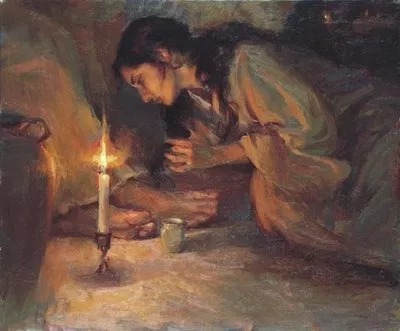
Where in the World is Ashara Dayne?
What do I believe?
I truly believe that Ashara Dayne is out there, whether we have met her in the text or in passing we do not know. Many of the various theories and speculation surrounding Ashara.
I don’t particularly agree with Ashara as Septa Lemore, although textually it would fit as a great comparison to biblical text for her to loyally be championing Christ’s Son (Aegon), as Mary of Magdalene loyally championed Jesus.
Further exploring the ideas in the text, I don’t believe that Ashara’s Daughter was stillborn- I think that Ned Stark ‘dishonored’ her at Harrenhal, when he was unpromised, and that the Dayne family passed Ashara’s daughter off as their own child once Ned had to fulfill his duty to the Tullys. I believe the Tower of Joy conspiracy goes deeper than we know, and that deaths were faked, (appropriately, Ashara’s) in order to keep the secret of the prince that was promised, the chosen one, the ‘King of Kings’. I do believe we’ll learn the truth of Ashara Dayne eventually, whatever it may just be.
She turned the mass of her crimes to virtues, in order to serve God entirely in penance
to close on a quote I threw in earlier, Ashara and Mary both made mistakes in their lifes, and the sacrifices Ashara made in the rebellion ring true. ——————–
Anyway, thanks for reading! I had a lot of fun looking into this and pulling some comparisons out. Thanks to Lady of Spears from TPOMF for listening to me rattle all day about this, and look out for others in the series- Leah and Rachel, Sisters and Wives to Jacob v. Catelyn, Lysa and Littlefinger, Blessed Virgin Mary, Jesus and Lyanna Stark and Jon Snow, and possibly some other fun writeups!
90 notes
·
View notes
Text
Ok, so I am going to start off and try to put some of my thoughts about the finale of The Handmaid’s Tale down. Fair warning - I wrote parts of this during gymnastics classes and swimming lessons when I was sitting on the sidelines ‘watching’, so it’s probably a bit long and rambling and I’m not sure I ever really get to my point? Which is about standard for me I think!
Serena’s desperation with her situation just bled through in the first part of this. June becomes her punching bag in punishment for her husband’s infidelity (and of course under such a patriarchal system it would be June who gets the blame - “you could have left me something” -, just as Janine was made to sit in the Red Centre and have ‘her fault’ chanted at her). I was glad to see that Serena did confront her husband, even though she's ultimately powerless to punish him and has to resort to throwing the Scrabble set on the floor.
And that theme of power and punishment really played out in this episode. June plays the only card she can when a pregnancy is confirmed and tells Serena she hasn't prayed for it, implying she doesn't want it. Serena then manages to out-manoeuvre her with the agonising trip to see Hannah who she parades in front of a helpless June in the most heartbreaking scene of the episode.
Elsewhere the council is deciding how to punish Putnam for his infidelity with Janine. I thought it was interesting that Waterford wanted to brush it away with a slap on the wrist - I'm not sure if this is a reaction to the fact he's just as guilty, or evidence that he's not as hard-line as the others. Book spoiler - the epilogue mentions Waterford (who is not confirmed as Offred’s Commander but one of a few possibilities) was ousted in one of the first purges. Given the conversation in the car in a previous episode suggested Waterford is their PR person, you can see how easily that would happen. It's the kind of position that sets you up to be the scapegoat when times get tough.
Two things struck me out of the whole Putnam trial and punishment - one was that like in many authoritarian regimes people are learning to work that repression to further their own goals. Mrs Putnam, now Angela's mother, can use the council and her own claim to piety to ensure her husband’s punishment is harsher than Waterford (and perhaps some of the others) would have suggested.
The other was that taking his hand was something that we've only seen done to handmaids before now and it's truly an emasculating punishment as a result. He's produced a child for Gilead and is therefore somewhat disposable now, but also his weakness is seen as womanly. This is the patriarchy controlling its own - although the true message is probably not don't sin but rather don't get outed. That's going to have a nasty trickle down effect on the handmaids who are the commanders’ objects of lust and therefore the ones most likely to out them (as Janine did).
And there's something I realised about Gilead when Serena was having her chat with Hannah in front of a trapped June, and that's that the real currency of Gilead is children. After all , that's what they were so eager to show the diplomats from Mexico, the handmaids were just a means to produce the wealth of Gilead. It's a society where ultimately your fortunes rise and fall depending on whether you have produced a child or potentially could, and this is somewhat true for everyone. But ownership of a child is the ultimate prize, and it's what Serena wants so badly and prompts that weird display of Hannah. And, really, while I understand June's pain and rage in that moment logically you have to wonder what Serena could actually do - Hannah is almost worth more in that world than Serena and June combined.
Given we know the punishment for just endangering a child is pretty severe (see what happens to Janine), really, what can Serena do to Hannah? The absolute worst thing would be to just leave her alone, have her live out her life in her new family, brought up as a child of Gilead prepared to do her duty when the time comes. In the book Offred watches some very young teenage girls get married off to returning soldiers and thinks about Hannah’s fate and, honestly, that seems scarier to me than anything Serena might threaten.
As an aside, Serena strikes me as a gambler, which makes her dangerous and unpredictable She's betting that June won't call her bluff just like she was prepared to bet her own previous privileges on the success of the Gileadean way of life with the jackpot of a baby up for grabs and while I condemn her choices and her actions I am drawn to her character slightly more than I am the weak willed Waterford who seems to have been pulled along and now uses his power and privilege to be the sleaze he couldn't be in his old life.
I liked that we saw Moira’s fate and the refugee process, although I have questions about how she got through check points in the car. But Luke's claiming of her as family was a middle finger to the Gilead regime who are trying to force new family structures on its society without much success.
And I liked that the episode ended in the same place as the book - June/Offred’s fate unknown and Nick still unconfirmed as true friend or foe. It really sets up season 2 to move forward with the story.
But I do have some reservations about what they seem to setting up as the beginning of the handmaid’s rebellion. The letters June was smuggling were awful and reinforced the devastation this regime has wrought on the lives of so many women and children, but where were those letters going? What good do they serve Mayday as an organisation of resistance? To me they were a little heavy handed - we'd already seen enough of Gilead to know that June's situation was not unique.
And the whole salvaging scene with the handmaids following June into throwing down their stones seems to suggest a sisterhood is rising despite the regime’s best efforts to keep its citizens wary and fearful (see Putnam’s wife begging for a harsh punishment as evidence of how quickly someone's words can harm you when everyone is always under suspicion by the state). I’m still trying to work out how I feel about that.
The handmaids refusing to do Aunt Lydia's bidding fits right into the whole power and punishment theme - perhaps they are taking Aunt Lydia's assertions about their own specialness to heart. And I really liked that it was the idea of stoning Janine that tipped Ofglen 2 over the edge. She was happy to trade her body for food and shelter but murder was beyond the pale.
But here is where I really noticed a difference to the books, and not just in the way the June is a less passive character than the novel’s Offred was, and that's in the way that the handmaids have been allowed to exist as a community outside their households.
In the book they shop in pairs still, but fear and suspicion keep the interactions muted. Salvagings are conducted not just for the handmaids to witness but for all of Gileadean society to view - it's part of keeping them fearful and obedient. While the handmaids are grouped front and centre, their place at the heart of this society confirmed, the wives and the marthas are also there, seeing everything.
In that world there'd be no revolt against Aunt Lydia without the risk of punishment at home, in private, in the domestic sphere where wives still hold the power. You want to show her up in public, fine, but you’ll pay later.
In the show the handmaids seem to have a slightly greater degree of autonomy, they have one foot in the household, but also one foot in this sisterhood that June has observed developing, at least in the way they no longer look at each other in terror. I thought that the fact they called on June to talk Janine off the ledge was telling in that even the people in power, while still basically using a handmaid to further their aims of having a child (albeit in a different way to using her to breed with), showed there was some recognition that handmaids are a group of people with friendships and a shared history. It may have been utter desperation that made them send for June, but it’s still a recognition that she is a person who is connected to Janine in a way the rest of them will never be - for once they were offering a carrot, not a stick.
Whether that connection between the handmaids ultimately gives them power though, remains to be seen.
Part of the aim of the book was to examine the way that domestic history is lost, that those most affected by change don't get to tell their story and that the lives of women most often fall into this category. Offred’s tale - incomplete and recorded in secret as she is banned from writing - is at its core the story of the household. Waterford, or whoever her commander actually is, is a blank and could be any of the men they speculate about in the epilogue. In the end it doesn’t matter because this isn’t his tale.
But the changes in the show - June’s growing awareness of the situation and, most importantly, her willingness to effect change to the whole system - stops this being just a story about a woman doing her best in a society that doesn’t value her, and therefore having her stand in for all women who’ve been forgotten by history.
And, actually, thinking about how the story was recorded, not written, in the original novel does make me wonder about all those letters June had. While you could see the paper they’d used was basically anything they could get their hands on - what were they using to write with? In households where the majority of the members are forbidden by law from writing, that’s an awful lot of pens and pencils they’ve managed to get their hands on. Or are they finding alternatives - in the book Offred is a little obsessed with the butter pats she’s using as moisturiser. I missed that in the show - but was this meant to be substitute for showing women making do, and one that has less personal vanity attached to it?
So I am still excited for season 2, still interested in what happens next, but perhaps a little wary of them turning this story into one where the people prevail over evil - even though I couldn’t imagine the story just remaining a long list of ways in which the women could be tortured (and I have stopped watching shows where the characters never get a break because it’s too much). I just hope they keep the balance they found in season 1. Oh, and that the Econowives in their stripy dresses from the book make an appearance - I miss them!
So yeah. @kliomuse, @natascha-remi-ronin @sambethe that’s really where I am at the moment. Hopeful, definitely, but I have probably spent waaay too much time thinking about the whole thing now!
#the handmaid's tale#sad that it's over#I want more shows like this#oh well#hopefully they do Alias Grace justice too
3 notes
·
View notes
Text
31 Genre Show Producers on the Heart of Their Series
Over the last month, executive producers of more than 30 current genre shows have taken part in Yahoo TV’s “Why Genre Shows Matter” survey, either via email or by phone. We’ve learned which genre show was the first to resonate with them, which genre show they believe deserved more Emmy love, which current genre show they think is tackling an issue well, and, if they were a Buffy the Vampire Slayer fan, what moment, episode, or arc best explains why in honor of the show’s 20th anniversary.
Our final question to them: What is the issue you’re proudest of tackling, or most invested in, on your own show? Read on for their answers.
Related: Yahoo TV’s Complete “Why Genre Shows Matter” Coverage
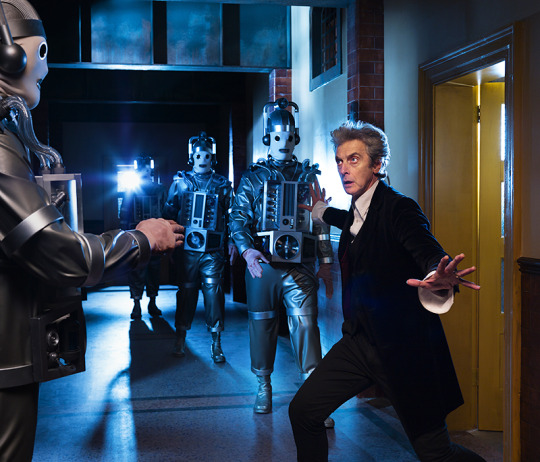
Brian Minchin (BBC America’s ‘Doctor Who’)
The Doctor sees horrors in the universe and faces them with kindness and understanding. (While reserving the right to blow things up if required). That standpoint goes into everything, and is hugely valuable. I love that children watch a hero do that. (Credit: BBC America)
Source: Yahoo TV
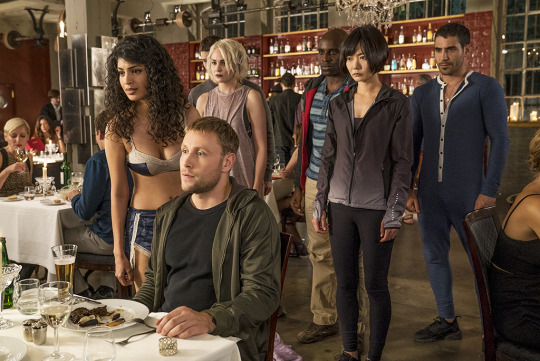
J. Michael Straczynski (Netflix’s ‘Sense 8’)
We designed Sense8 to say that regardless of where we are born, what our ethnic background, gender or sexuality might be, we are more alike than we are different, that what unites us is stronger than what divides us, and that the common coin of our shared humanity trumps the forces that would set us at each others’ throats. At a time when we are being tribalized and factionalized and marginalized as never before, we felt that was an important message to convey, and it’s only become more relevant and vital in the last year or so. (Credit: Netflix)
Source: Yahoo TV
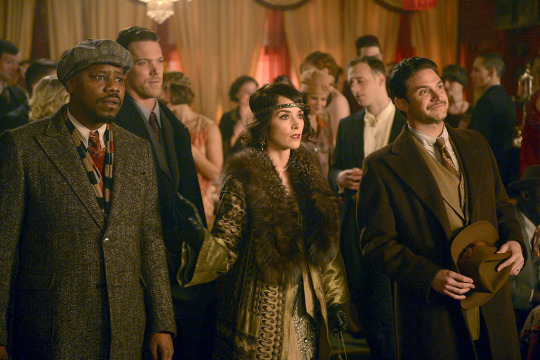
Eric Kripke (NBC’s ‘Timeless’)
I’m really proud of how Timeless shines a light on some of the lesser known stories in history, often involving the heroic contributions of women and minorities. I’m proud of how we’ve established ourselves as a warm, multi-ethnic, inclusive view of history. Because one, it’s the truth, and two, America’s history should be for everyone. (Credit: Sergei Bachlakov/NBC)
Source: Yahoo TV
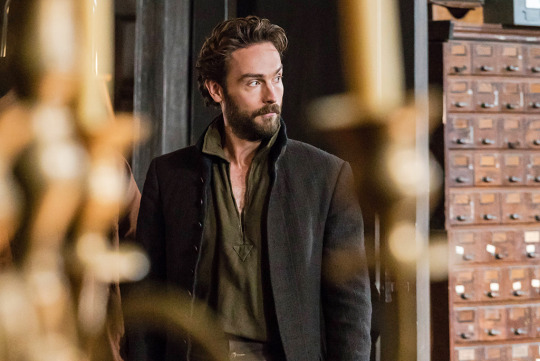
Albert Kim (Fox’s ‘Sleepy Hollow’)
This season on Sleepy Hollow, Ichabod Crane has gone head-to-head with a villain who believes that America has failed as a social and political experiment and that tyranny is how the country needs to move into the future. Which means Crane has been forced to defend the ideals of the country he helped establish over two centuries ago. It’s a situation that’;s allowed us to explore the question: What makes America America? Through that lens, we’ve looked at the stories of real historical figures like Benjamin Banneker, a Revolutionary War-era African American surveyor and engineer who knew that when Thomas Jefferson wrote the phrase, “All men are created equal,” it sadly didn’t apply to everyone. Now, more than ever, seems to be a good time to be bringing up issues like this, even in a fictional context. (Credit: Tina Rowden/Fox)
Source: Yahoo TV
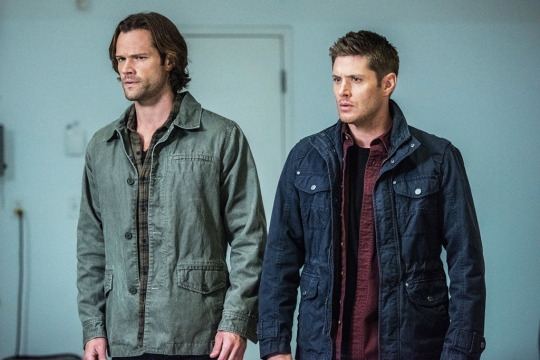
Robert Singer (The CW’s ‘Supernatural’)
I think as the show has matured, we’ve become very conscious of the idea that world is not black and white, and that the shades of gray in this life are not easy to deal with, but it is important to try. Sam and Dean have certainly, over time, found their moral center, and because of this they try very hard not to see the world in just black or white. This season, with The British Men of Letters, who do view the world in black and white, has given our leads moral challenges which for the most part they have been up to handling. When they haven’t been up to the task, the lessons learned from these episodes have been profound. I think the best genre shows try to do this, and while good lessons learned are very valuable, it also makes for better storytelling. (Credit: Dean Buscher/The CW)
Source: Yahoo TV
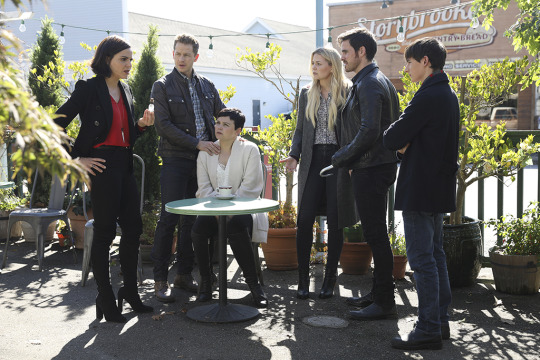
Adam Horowitz and Edward Kitsis (ABC’s ‘Once Upon a Time’)
There’s a saying on our show that we keep coming back to: “Evil isn’t born, it’s made.” Once Upon a Time is at its core a show about hope and optimism. We like to believe that the world is filled with good and when evil does rear its head it’s because circumstance conspired to create it. And if circumstance can create evil, then those same circumstances can be defeated, and the best of humanity can win out in the end. (Credit: Jack Rowand/ABC)
Source: Yahoo TV
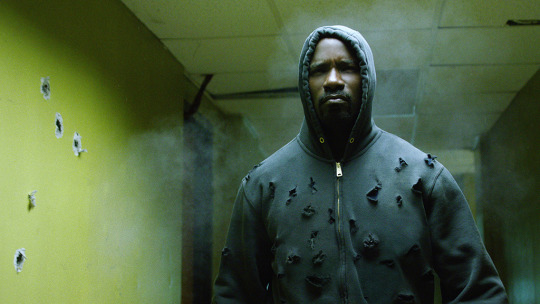
Cheo Hodari Coker (Netflix’s ‘Luke Cage’)
I love the fact that we have two black male characters that you’ve never seen before. You’ve never seen a burly 240-lb. black man that can throw stuff that’s also a bookworm, and you’ve never seen a musician that’s a gangster. And the fact that you have a gangster that is really just a frustrated musician is interesting. And what Simone Missick did with Misty Knight or what Alfre [Woodard] did incredibly with Black Mariah, I mean, it’s just next level… All Blaxploitation is, is the opportunity for an African-American cast or lead actor or actress to do the same things that a white action hero gets to do… The reason that Shaft has a dominant theme song is because James Bond has a dominant theme song… I wanted the show to not be embarrassed by the Blaxploitation roots, but embrace it. Then at the same time, open up the camera, so to speak — widen the aperture — to include other genres. I mean, honestly, what Luke Cage; it’s a hip-hop Western. And you have Luke Cage as the sheriff of Harlem. He’s basically Shane. He’s Shane or he’s any number of reluctant heroes as played by Clint Eastwood. (Credit: Netflix) Read our full conversation with Coker.
Source: Yahoo TV
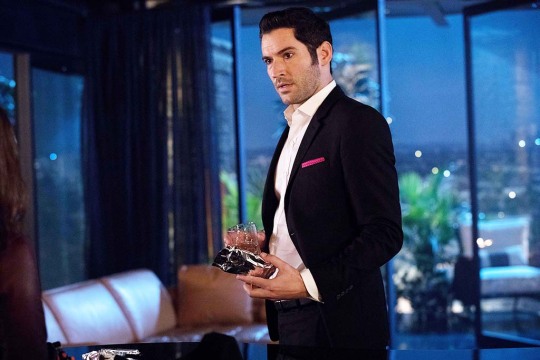
Joe Henderson (Fox’s ‘Lucifer’)
In the second episode of the show, we established that our lead male character is bisexual, which I think is pretty rare on network TV. We worried the studio and network might push against it, but instead, they championed it. And when I mentioned it to Tom (Ellis, Lucifer himself) he just shrugged. “Well of course he is.” When it aired, the only reaction was positive. I’m proud that what we thought might be pushing boundaries/creating controversy was instead welcomed as normal. Because of course it is. (Credit: Jack Rowand/FOX)
Source: Yahoo TV
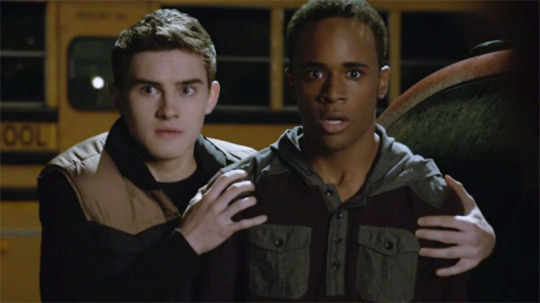
Jeff Davis (MTV’s ‘Teen Wolf’)
The idea of inclusion on Teen Wolf has always been something for which we strive. We’ve heard from fans that how being gay is treated so nonchalantly in the world of Teen Wolf has been something they’ve loved most about the show. (Credit: MTV)
Source: Yahoo TV
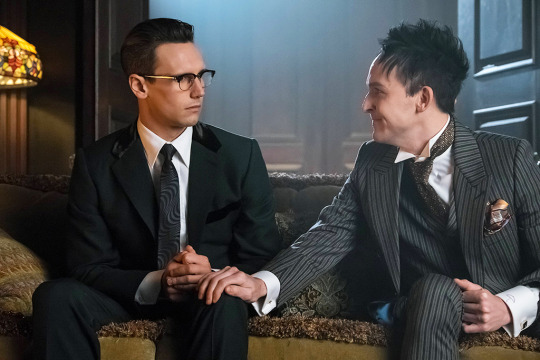
Ken Woodruff (Fox’s ‘Gotham’)
The story I’m proudest of is from this season (Season 3). We were able to take a popular character from the canon of DC Comics, Penguin, and tell a personal, real, heartbreaking love story between him and another male character, Edward Nygma. (Credit: Jeff Neumann/FOX)
Source: Yahoo TV
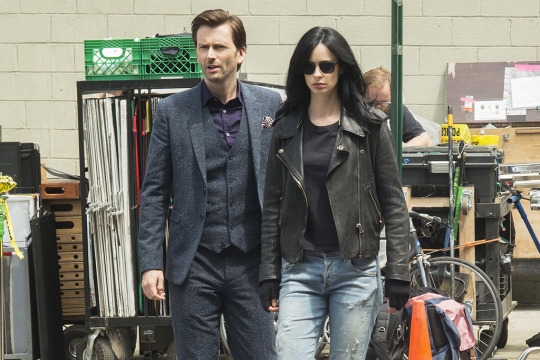
Melissa Rosenberg (Netflix’s ‘Jessica Jones’)
In the comic books, Jessica wasn’t actually raped — she was an imprisoned voyeur to it, and we just wanted to make it a more personal experience and more realistic. We really were just telling the story of this character and never said, “Okay, we’re going to tackle the issue of rape or domestic violence or any issue like that.” We’re just going to tell her story and be responsible about it and be honest with the character. And so when it aired, there were initially all these think pieces on how it addressed rape and domestic violence. And then we were like, “Yes, that’s exactly what we intended to do!” Obviously we were dealing with an issue, but we never approached it that way. The minute you step on a soapbox is the minute people stop listening to you. (Credit: Netflix) Read our full conversation with Rosenberg and The Magicians showrunner Sera Gamble.
Source: Yahoo TV

Sera Gamble (Syfy’s ‘The Magicians’)
We felt that sexual assault was really the core of the Magicians story. The reveal that the Big Bad [The Beast] evolved into a monster as a defense mechanism to protect himself because he was being sexually abused as a young boy struck my partner, John McNamara, and me as a really amazing use of fantasy, and it felt psychologically real. It was non-negotiable for us. We really wanted to tell that story. It kind of became the guiding mechanism for the whole show; just the idea that fantasy is used to explore darkness and the human psyche and the various evils that we do to one another and to human beings. When we got to [where] Julia is assaulted by a trickster god, it’s a very graphic rape scene. What was important to us was to be honest and unflinching about it. We didn’t want to find any trapdoors that we could go through that made it less personal for the audience. So for example, we could have made the creature that assaulted her look less human and we chose not to. We wanted him to feel as human and present in the room as possible. Most important for us, when we filmed that scene, was to stay in Julia’s point of view, to make sure we were telling her story, and that she never became the object of the story. She was always the subject of the story. (Photo by: Carole Segal/Syfy) Read our full conversation with Gamble and Jessica Jones showrunner Melisssa Rosenberg.
Source: Yahoo TV
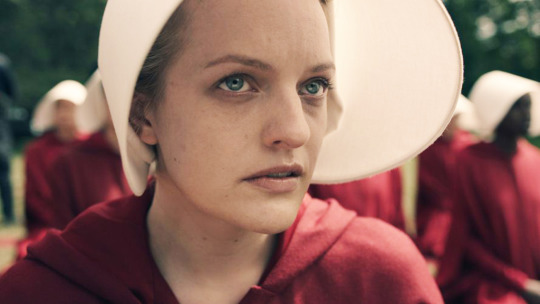
Bruce Miller (Hulu’s ‘The Handmaid’s Tale’)
I’m proudest of the way the show deals with institutionalized sexism and misogyny. The show takes place in an alternative present where women are commodified and strictly oppressed under threat of violence. In a world like this it’s easy to get lost in categories, i.e. victims, collaborators, oppressors, but I’m proud of how our show tries to humanize everyone in Atwood’s Gilead. (Credit: Take Five/Hulu)
Source: Yahoo TV
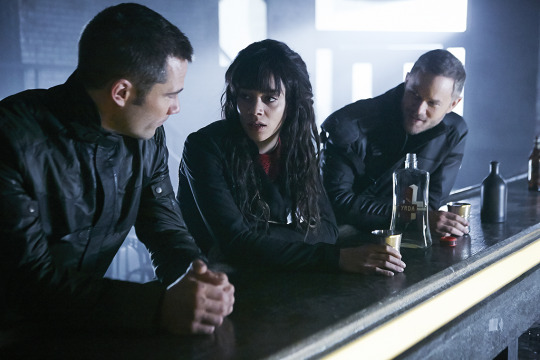
Michelle Lovretta (Syfy’s ‘Killjoys’)
Consent and agency are important themes in most of my work, and are also just a natural fit when dealing with science fiction, especially as a woman. In Killjoys, a lot of our long arcs are about systems trampling on the rights of individuals… and then we sit back, crack a beer, and have fun watching how our smartass underdogs win out. (Credit: Ian Watson/Syfy/Killjoys II Productions Limited)
Source: Yahoo TV
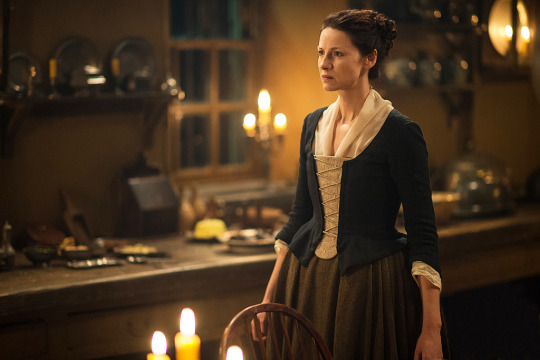
Ronald D. Moore (Starz’s ‘Outlander’)
I’m proud of the way we depict our heroine as a smart, strong woman who is able to adapt to living in the past without losing her sense of self. She’s not a damsel in distress and she’s often the one to come to the rescue of the man she loves. (Credit: Starz)
Source: Yahoo TV
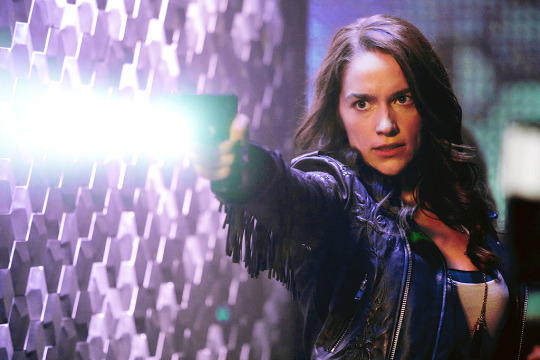
Emily Andras (Syfy’s ‘Wynonna Earp’)
I’m very proud of the female representation on Wynonna Earp — has there ever been a western with more women running around firing guns and kicking ass? — and I like to think we handled the LGBT storyline delicately with grace and good spirit. (Credit: Michelle Faye/Syfy/Wynonna Earp Productions)
Source: Yahoo TV
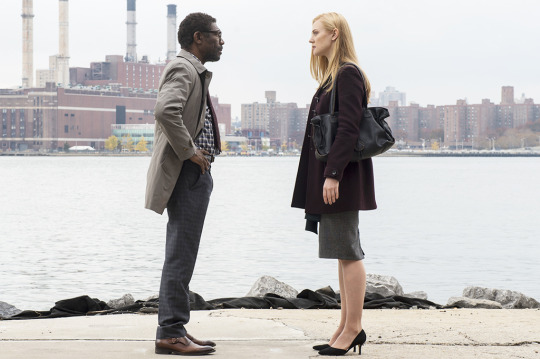
Marco Ramirez (Netflix’s ‘Daredevil’)
From the beginning, Daredevil has been concerned with characters who uncover truth, whether through vigilante activity or journalistic integrity. The Ben Urich story, which then became Karen Page’s story, is something that seems to take on a new and different meaning every year. Season 1, it was about taking down Wilson Fisk. Season 2, it became about uncovering the truth behind the murder of Frank Castle’s family. Maybe it’s The X-Files still in my DNA, but “the truth is out there” is a hell of a dramatic motor in TV. (Credit: Barry Wetcher)
Source: Yahoo TV
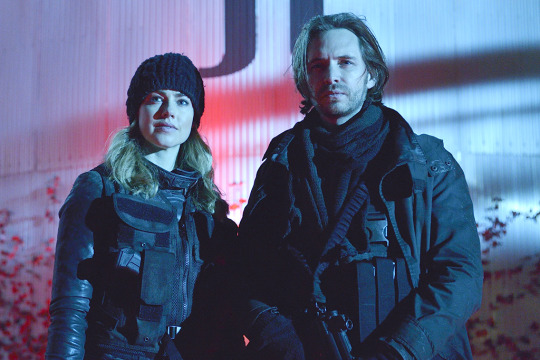
Terry Matalas (’12 Monkeys’)
12 Monkeys is pretty morally gray, through and through — which gives us great latitude to explore things like blind faith in any kind of doctrine. We delve into how one can be driven to do terrible things: Fear. Love. Faith. (Credit: Ben Mark Holzberg/Syfy)
Source: Yahoo TV
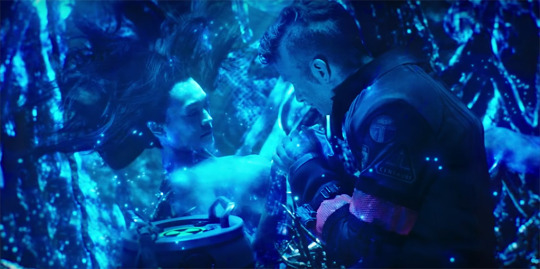
Mark Fergus (Syfy’s ‘The Expanse’)
You’ve got these middle-aged guys who have lived badly, or if they had convictions they lost them, they tripped and fell in life and they’re trying to find a way back to the light… That’s the story we gravitate to because I feel like we have something to say about that. It’s Children of Men, it’s Tony Stark, it’s Rick from Casablanca, it’s The Verdict. [In Season 2’s “Home”] Miller felt like his whole life had been the fabric leading him up to this moment, so the fact that he was a f–kup his whole life actually helped him in the moment where he needed to redeem himself. That final scene with Julie, that was the reason we wanted to make this show. That was the whole heart of it. It’s not only the heart of the book, I think it’s the heart of the whole show. (Credit: Syfy) Read our full conversation with Fergus.
Source: Yahoo TV
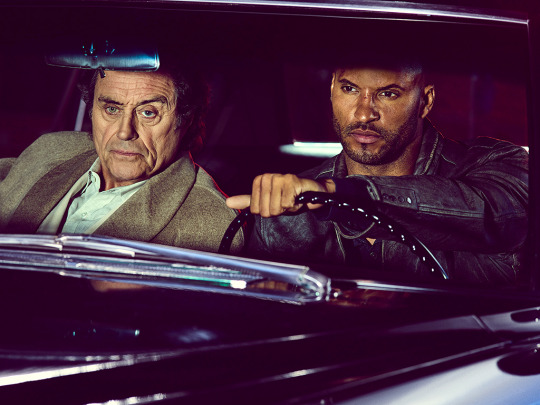
Bryan Fuller and Michael Green (Starz’s ‘American Gods’)
Fuller: We’re very proud of the coming-to-America stories. We told them because we were very moved by them as reminders of how we all got here. And when we made them, we thought everyone would be moved by them too and were very surprised to find out by the time it airs — especially after November — those immigration stories have become far more political than we would have ever expected. If people are moved by them, so much the better. If people are challenged by them, that’s there too, and not a bad thing at all. (Credit: Starz) Read our full conversation with Fuller and Green.
Source: Yahoo TV
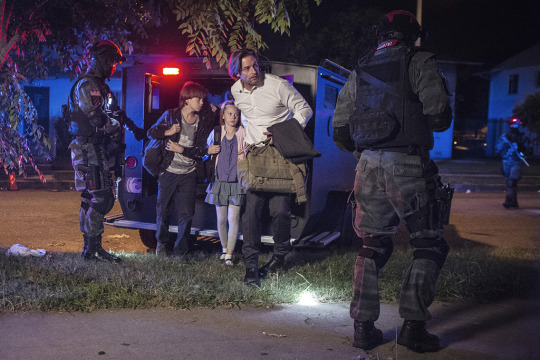
Ryan Condal and Carlton Cuse (USA’s ‘Colony’)
Condal: We’re proudest of the human drama in Colony. The genre, the science-fiction, is just a backdrop that applies the correct pressures (i.e., an alien occupation of Los Angeles) to explore the themes in which we are most interested. This season, there are two particular issues that are addressed that really interested us. In episode 2.04 (“Panopticon”), we dramatize the very real and growing technological surveillance state as it applies to the world of Colony and, in particular, the Bowman family. What happens to a society when it lives in constant fear of being watched? Can anyone trust anyone? The answers are dark and approaching the nihilistic, which is why we were so drawn to it. The other issue is the true nature of resistance. When we think of the word “resistance,” in a science-fiction context, it tends to conjure images of the Rebel Alliance in Star Wars and Sarah Connor in The Terminator. But real resistance is ugly. It’s politically motivated, it’s brutally violent, it is uncompromising, and it is often utterly futile. This is a big theme this season, particularly in the second half, and I think the audience will be surprised about what Colony has to say about the issue. (Credit: Isabella Vosmikova/USA Network)
Source: Yahoo TV
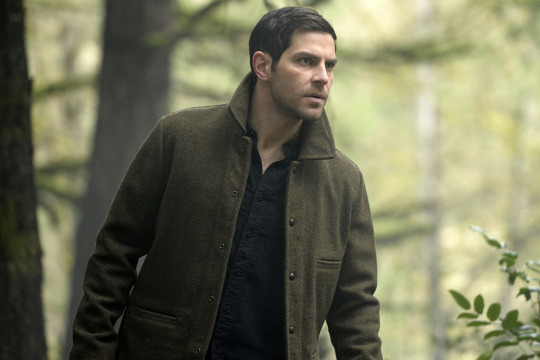
David Greenwalt and Jim Kouf (NBC’s ‘Grimm’)
Greenwalt: Grimm attempts to offer an explanation for monstrous behavior and the inexplicable nature of evil. Kouf: The environmental issue in episode 9 of this season, as the environment is an issue that’s important to me, and the senility issue in episode 10 of this season, as it is an issue we all have to deal with. (Credit: Allyson Riggs/NBC)
Source: Yahoo TV
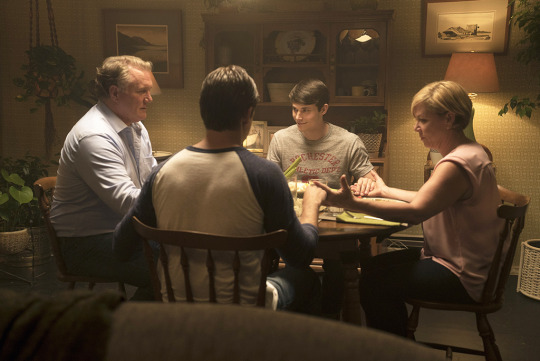
David Eick (Freeform’s ‘Beyond’)
Beyond is interested in how a nuclear family holds together despite extraordinary events, and how growing up and becoming an adult is sort of like learning to be a superhero. (Credit: Katie Yu/Freeform)
Source: Yahoo TV
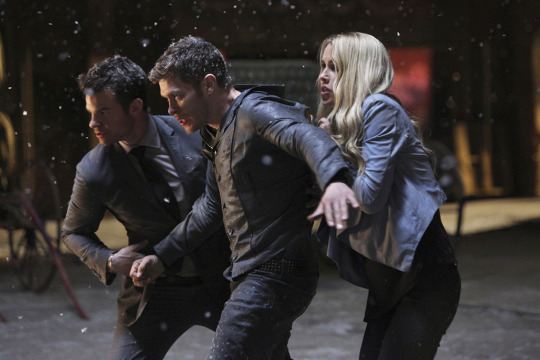
Julie Plec (The CW’s ‘The Originals’)
It’s all about family, for better or for worse, through the good and the bad. It’s about the bonds of blood. And as children of dysfunction and abuse and tyranny, it’s about how these kids grew up to be both the worst parts of that and the best parts of themselves in spite of it all. (Credit: Annette Brown/The CW)
Source: Yahoo TV
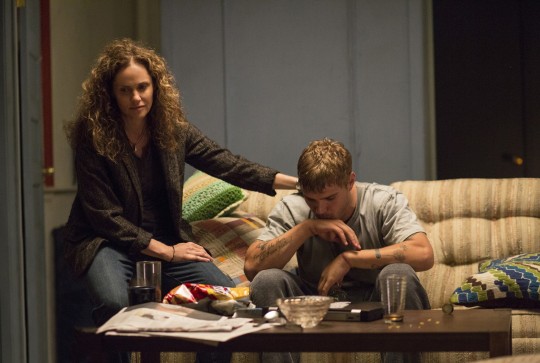
Damon Lindelof (HBO’s ‘The Leftovers’)
I feel most proud of the way our show addresses grief… how surprising and upsetting and nonsensical coping mechanisms can be, whether that mechanism is joining a cult or hiring prostitutes to shoot you in the chest. There is no more profoundly complex human emotion than the one associated with losing someone you love and The Leftovers is a constant examination of that idea. (Credit: HBO)
Source: Yahoo TV
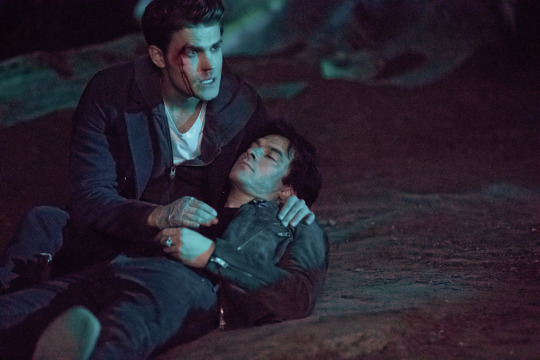
Julie Plec (The CW’s ‘The Vampire Diaries’)
I think that we said a lot that this is a show about love and loss. And those are two extremely universal things that everybody on this planet goes through at one point in their lives. They, with luck, fall deeply in love at least once. Unfortunately, over the course of a lifetime, they experience loss more times than anyone could hope. It’s very difficult for people to express themselves emotionally to deal with those emotions. In the phases of managing and moving on from grief, it’s a very complicated journey. A show that tackles issues of loss and grief, like what we do, is just another tool out there in the universe to let you sit and have a good cry, or to see something about your own experience in this fiction. (Photo: Bob Mahoney/The CW) Read our full conversation with Plec.
Source: Yahoo TV
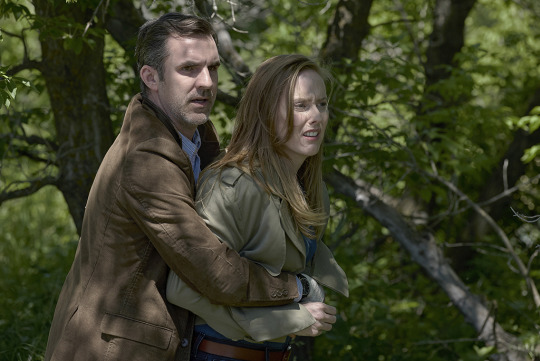
Nick Antosca (Syfy’s ‘Channel Zero’)
Loss and the experience of coping with it, in Channel Zero: Candle Cove. We’re a horror show, and loss is the most universal real world horror. (Credit: Allen Fraser/Syfy)
Source: Yahoo TV
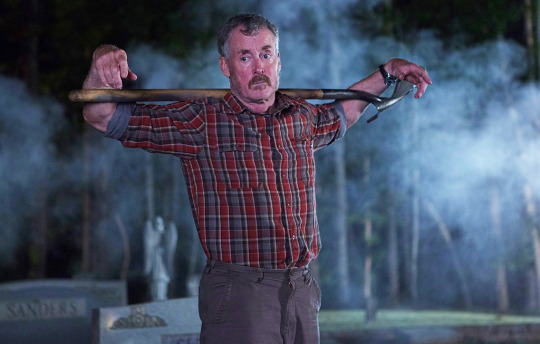
Dana Gould (IFC’s ‘Stan Against Evil’)
Stan Against Evil is largely about moving on after loss. We start Season 1 at the funeral of our lead character’s wife, and by the end of the season, he has only started to come to terms with it. I went through a divorce a couple years ago, and didn’t realize until midway through filming that I had been writing about myself. (Credit: Kim Simms/IFC)
Source: Yahoo TV
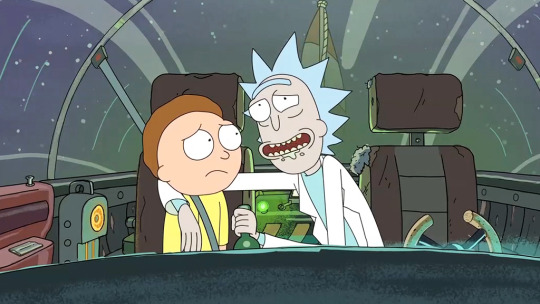
Dan Harmon (Adult Swim’s ‘Rick and Morty’)
I am proud that our show addresses what I consider the root of all our issues: it’s better to have felt an unfeeling universe than never to have felt at all. (Credit: Cartoon Network)
Source: Yahoo TV
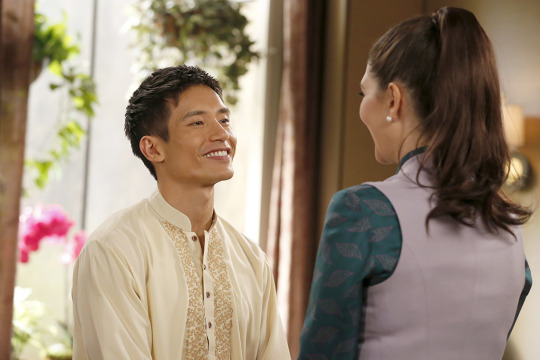
Drew Goddard (NBC’s ‘The Good Place’)
I believe The Good Place is the first show to explore sexual relations between an anthropomorphized afterlife information delivery system and a gentleman from Jacksonville, but it’s possible St. Elsewhere got there first. (Credit: Vivian Zink/NBC)
Source: Yahoo TV
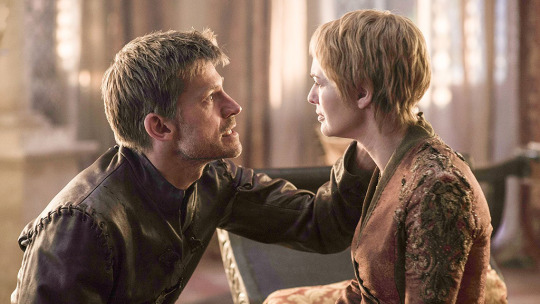
David Benioff and D.B. Weiss (HBO’s ‘Game of Thrones’)
We spend a lot of time pondering the complexities of incestuous relations. Talk about a sticky situation! (Credit: HBO)
Source: Yahoo TV
#Lucifer#Stan Against Evil#Once upon a time#Grimm#_uuid:4606a420-c5ca-39e5-94a9-ec4fb44406fc#Killjoys#Beyond#Why Genre Shows Matter#supernatural#sense8#interviews#channel zero#Gotham#luke cage#Genre EP Questionnaire#Timeless#Jessica Jones#Wynonna Earp#Teen Wolf#12 Monkeys#The Expanse#_revsp:wp.yahoo.tv.us#Rick and Morty#sleepy hollow#American Gods#Doctor Who#The Good Place#_lmsid:a0Vd000000AE7lXEAT#The Originals#The Leftovers
28 notes
·
View notes